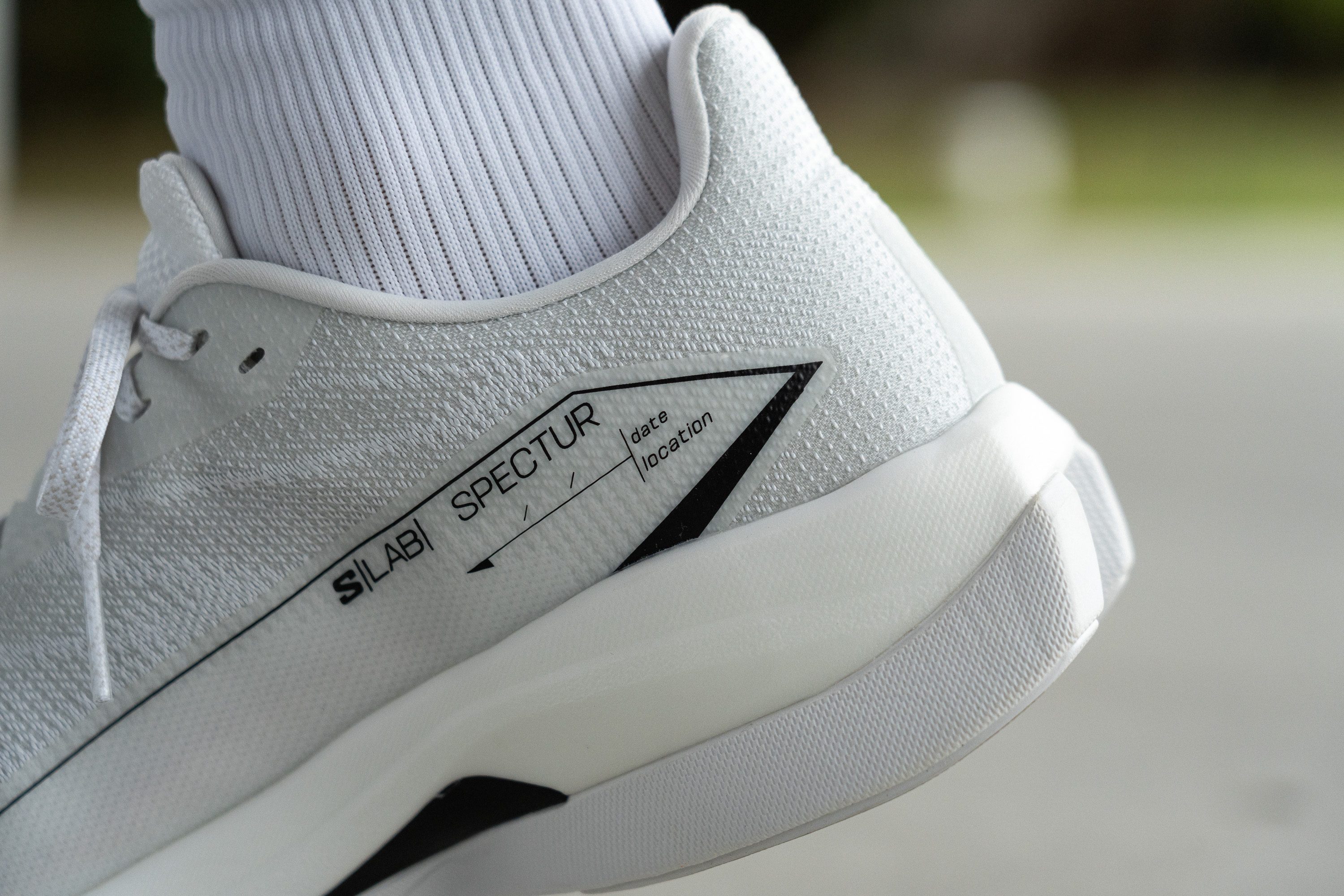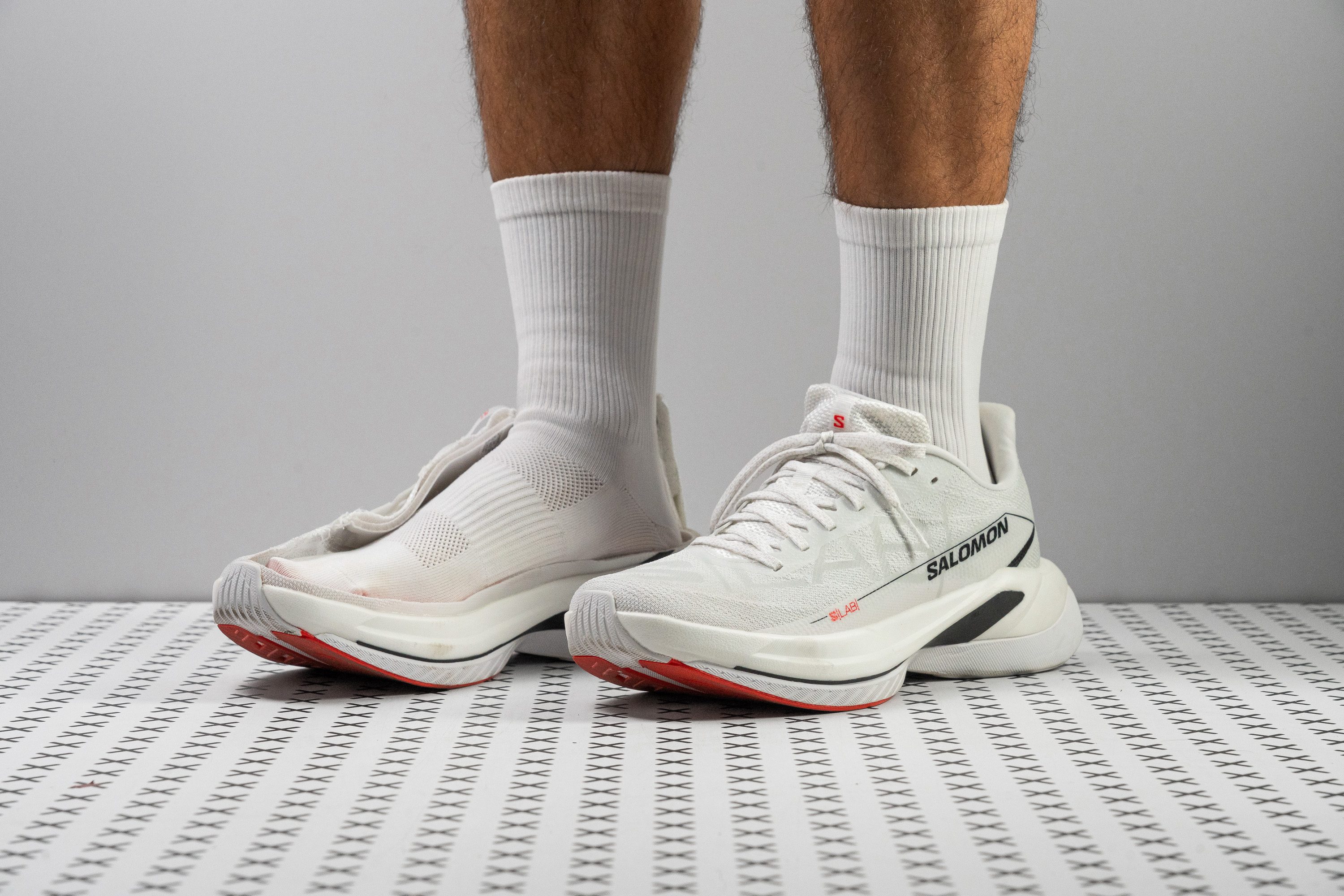Our verdict
Pros
- Great shock absorption in the heel
- Softer underfoot experience with PEBA foam
- Rocker ensures quick and smooth transitions
- Regular medium fit (not narrow as stated)
- Fantastic grip on wet and dry surfaces
- Accommodates heel strikers
- Solid outsole durability
Cons
- Disappointing energy return for the price
- Could be lighter for a supershoe
- Deviations in stack and drop
Audience verdict
Comparison
The most similar running shoes compared
+ + Add a shoe | |||||
|---|---|---|---|---|---|
| Audience score | 79 Good! | 81 Good! | 84 Good! | 83 Good! | |
| Price | $220 | $190 | $180 | $165 | |
| Pace | CompetitionTempo | Daily runningTempo | Daily runningTempo | Daily runningTempo | |
| Shock absorption | High | High | High | High | |
| Energy return | Moderate | Moderate | High | Moderate | |
| Traction | High | High | High | High | |
| Arch support | Neutral | Neutral | Neutral | Neutral | |
| Weight lab Weight brand | 9.1 oz / 258g | 9.3 oz / 264g 8.9 oz / 252g | 9 oz / 255g 9 oz / 255g | 8.4 oz / 238g 8.2 oz / 232g | |
| Lightweight | ✗ | ✗ | ✗ | ✓ | |
| Drop lab Drop brand | 10.7 mm 8.0 mm | 9.5 mm 5.0 mm | 9.0 mm 8.0 mm | 6.8 mm 5.0 mm | |
| Strike pattern | Heel | HeelMid/forefoot | HeelMid/forefoot | Mid/forefoot | |
| Midsole softness | Balanced | Soft | Soft | Balanced | |
| Difference in midsole softness in cold | Small | Small | Small | Small | |
| Toebox durability | Decent | Decent | Bad | Decent | |
| Heel padding durability | Decent | Good | Good | Decent | |
| Outsole durability | Good | Good | Decent | Good | |
| Breathability | Moderate | Moderate | Breathable | Moderate | |
| Width / fit | Medium | Narrow | Narrow | Medium | |
| Toebox width | Medium | Narrow | Narrow | Wide | |
| Stiffness | Stiff | Stiff | Stiff | Stiff | |
| Torsional rigidity | Stiff | Stiff | Stiff | Stiff | |
| Heel counter stiffness | Flexible | Flexible | Flexible | Flexible | |
| Rocker | ✓ | ✓ | ✓ | ✓ | |
| Heel lab Heel brand | 36.9 mm | 42.9 mm 44.0 mm | 45.4 mm 46.0 mm | 36.0 mm 37.0 mm | |
| Forefoot lab Forefoot brand | 26.2 mm | 33.4 mm 39.0 mm | 36.4 mm 38.0 mm | 29.2 mm 32.0 mm | |
| Widths available | Normal | NormalWide | Normal | NormalWide | |
| Orthotic friendly | ✓ | ✓ | ✓ | ✓ | |
| Season | All seasons | All seasons | SummerAll seasons | All seasons | |
| Removable insole | ✓ | ✓ | ✓ | ✓ | |
| Ranking | #330 Bottom 13% | #297 Bottom 22% | #244 Bottom 36% | #258 Bottom 32% | |
| Popularity | #349 Bottom 8% | #111 Top 29% | #151 Top 40% | #239 Bottom 37% |
Who should buy
The S/Lab Specter requires some clarification regarding its target audience. Based on our thorough lab and wear tests, we think that it caters to runners who:
- prefer cruising at a moderate yet consistent pace (8-9 min/mile) without aiming at elite-level PRs (and most super shoes feel too aggressive to them)
- have a heel-striking pattern and could use a higher drop and a wider heel
- often run on wet roads or track, and need a highly reliable outsole grip
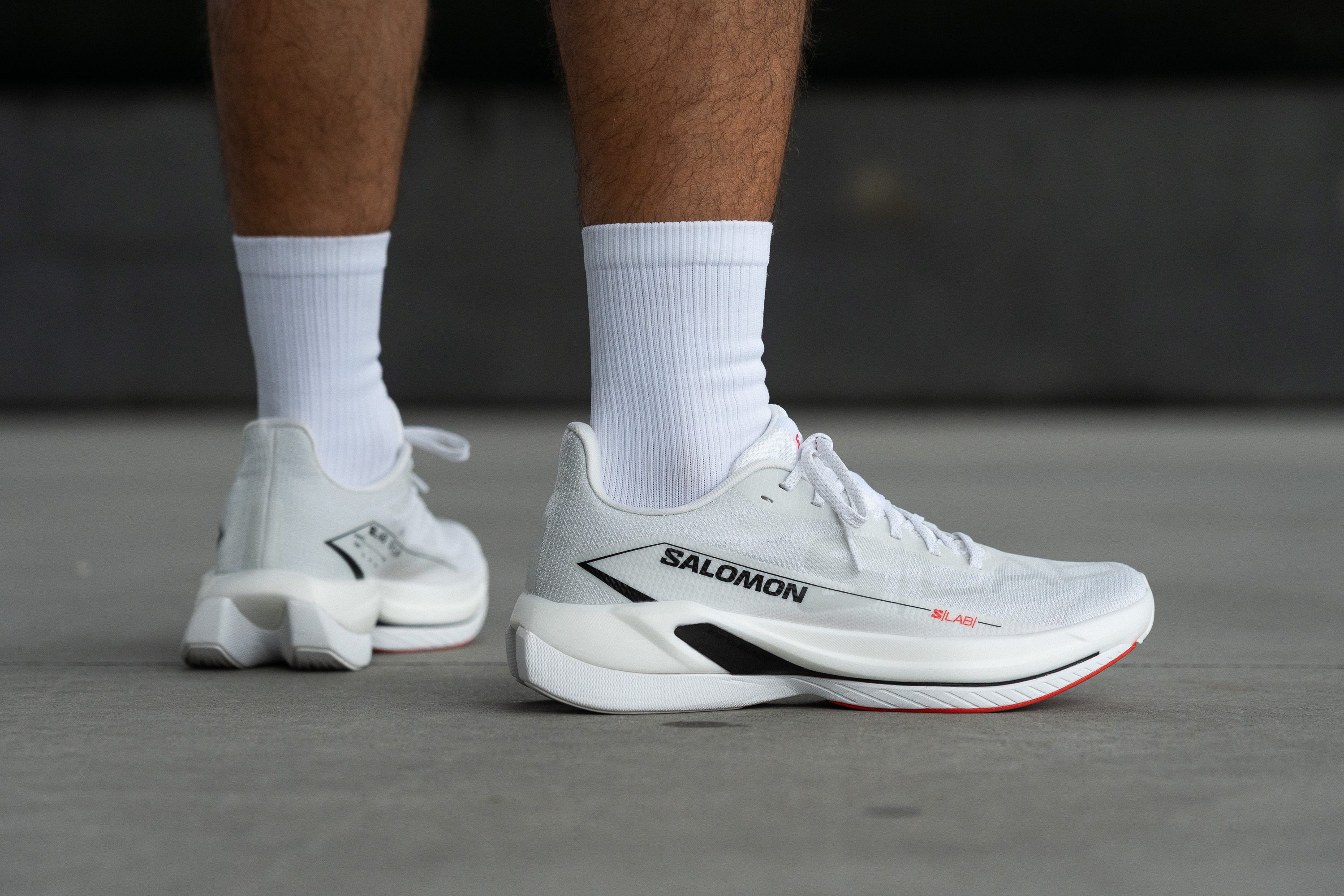
Who should NOT buy
Aimed at runners who finish a marathon in 3:30 hours or more, our energy return tests confirmed that the S/Lab Spectur is not a rocket that could propel you forward to a new PR. But then, if it's not an elite shoe, why elite-priced?
The same MSRP range can get you the highly regarded PUMA Deviate Nitro Elite 3 and the Saucony Endorphin Pro 4, among other fantastic tempo and competition shoes.
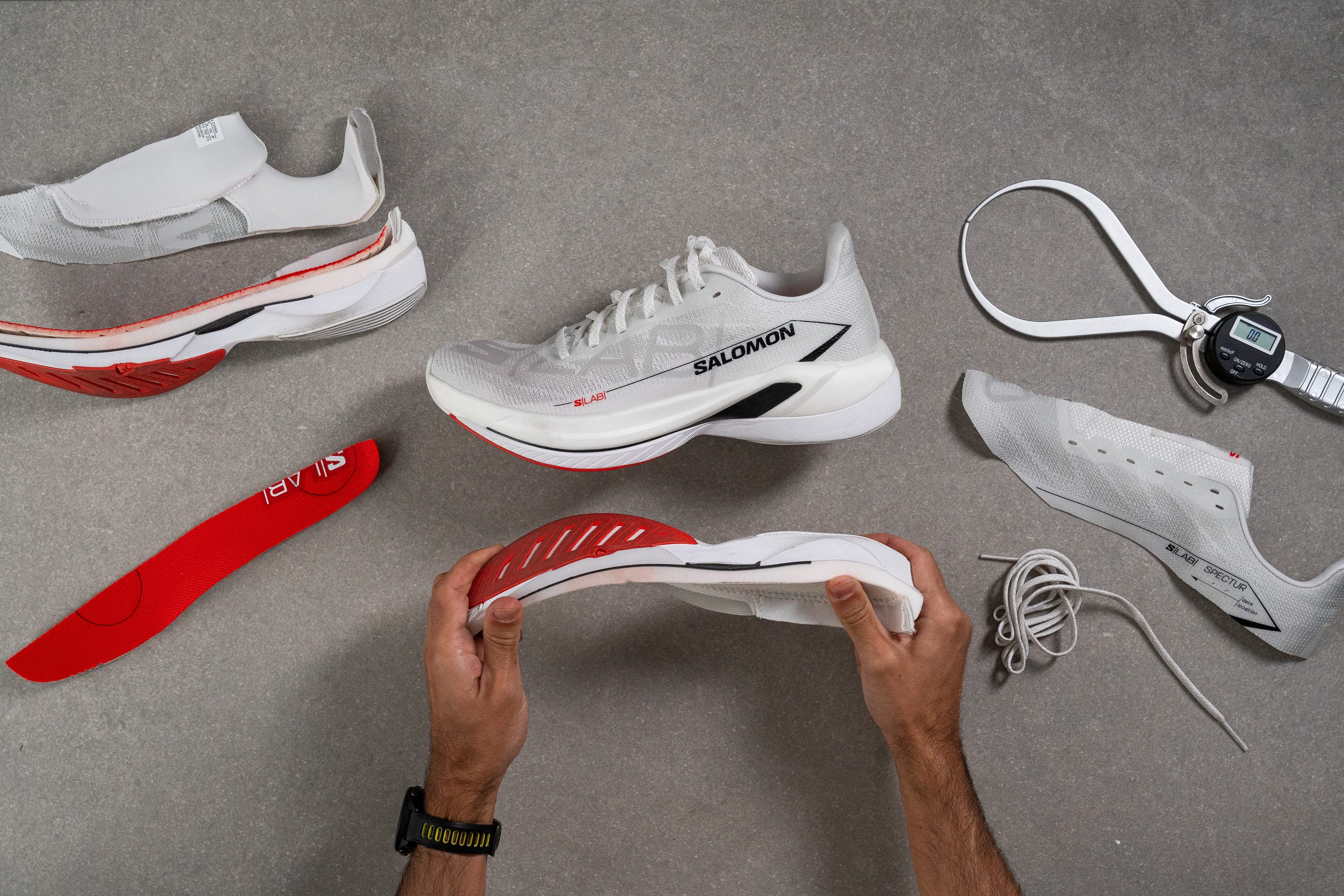
Cushioning
Shock absorption
As a step-up version of the regular Spectur, the S/Lab Spectur showed notably better shock absorption results, particularly in the heel.
The latter returned as much as 138 SA (over the regular version's 129 SA), making the S/Lab shoe more ready for a marathon distance. The forefoot, on the other hand, remained below the average mark at 97 SA. Not so friendly for forefoot strikers.
The S/Lab Spectur's increased impact protection comes from its dual-density cushioning setup, which combines a standard optiFOAM (EVA) and a more advanced optiFOAM+ (EVA+PEBA).
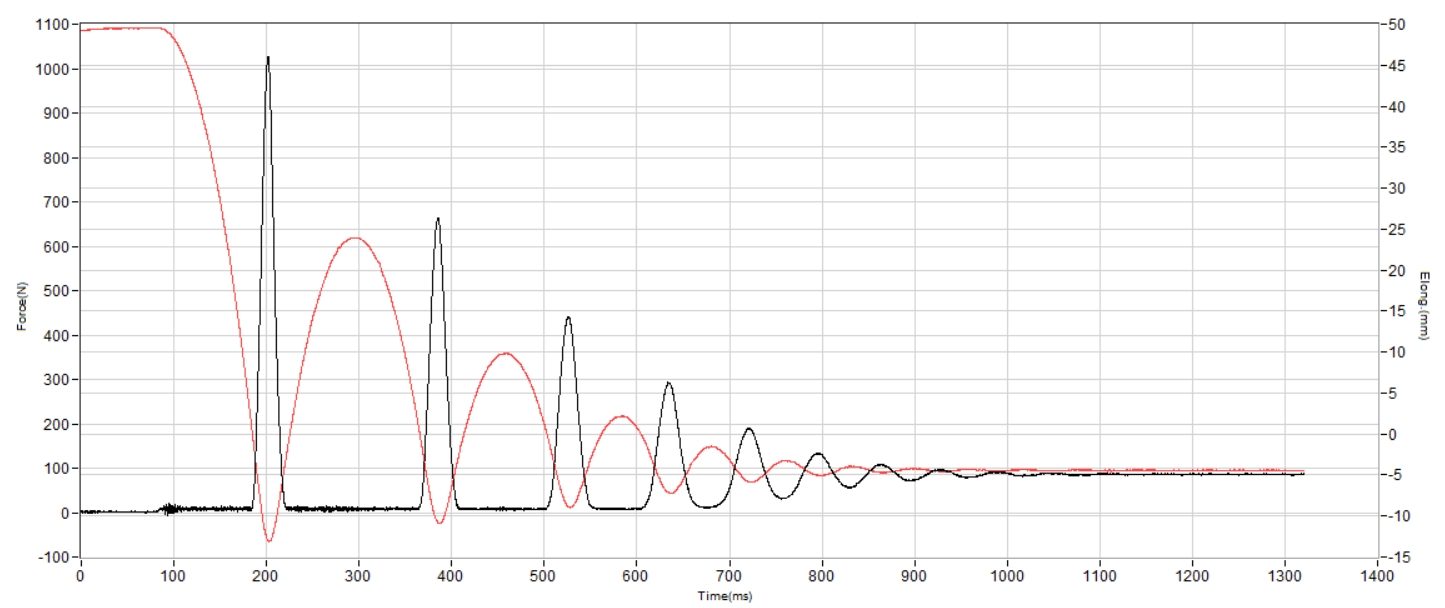
| S/Lab Spectur | 138 SA |
| Average | 130 SA |
Energy return
The presence of PEBA raised our hopes high for the shoe's energy return, but they shattered the very moment our machine recorded the results...
With only 55.5% in the heel and 55.8%, the S/Lab Spectur's rebound was a major disappointment! Not only is it below the category average, it is way....way behind the other shoes at the $220 price point!
For a decent race-day energy return, you would have to turn to Salomon's $250 S/Lab Phantasm 2. But even for an all-PEBA setup, it's not perfect at 57.8% 62.1% either.
| S/Lab Spectur | 55.5% |
| Average | 58.6% |
Heel stack
Measuring the S/Lab Spectur's stack height following the World Athletics' approach (12% and 75% of the shoe's length), our caliper recorded 36.9 mm in the heel. This is slightly short of the officially stated 38.5 mm, but the difference is not big enough to be tangible on the foot.
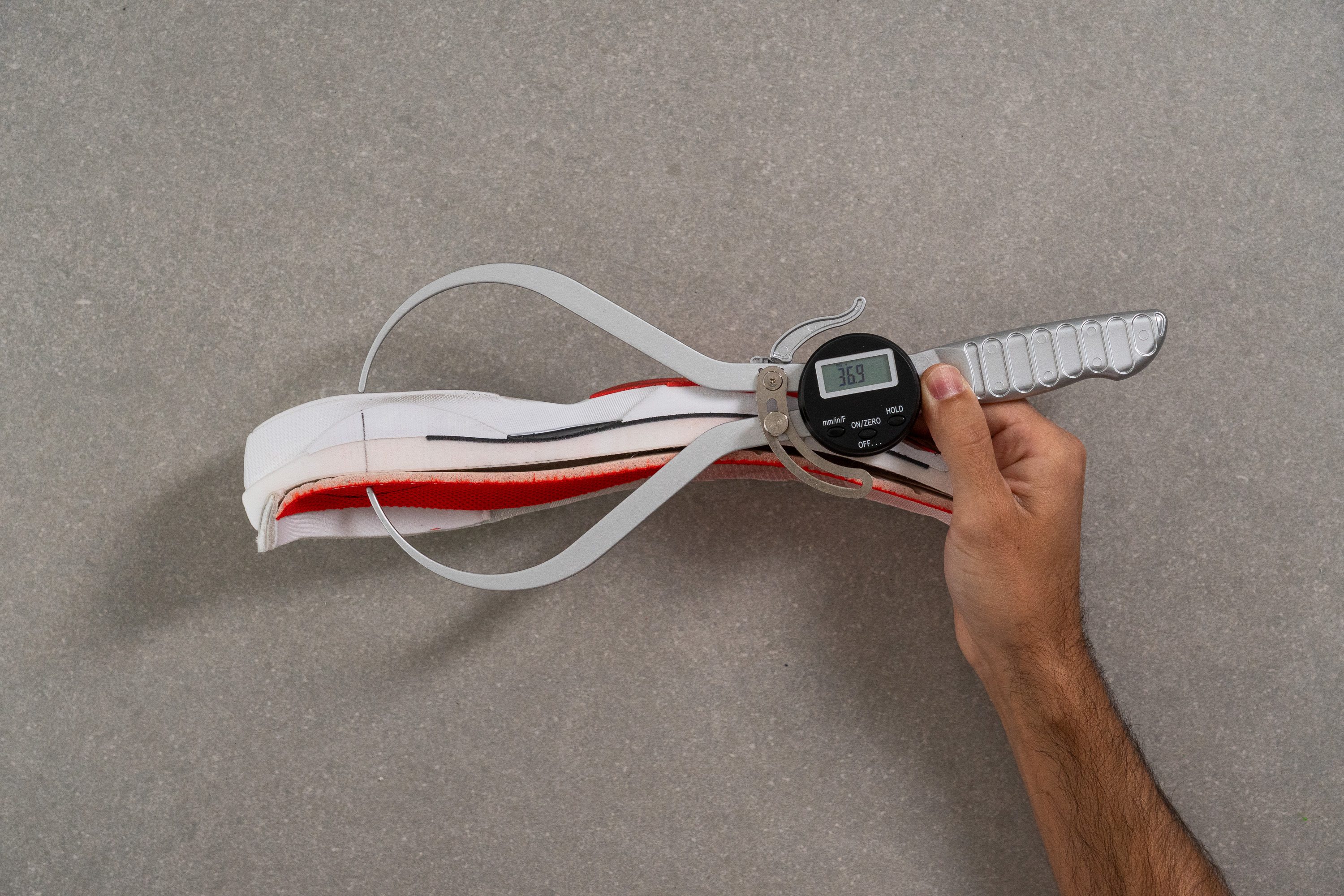
| S/Lab Spectur | 36.9 mm |
| Average | 34.8 mm |
Forefoot stack
The forefoot, on the other hand, came out significantly lower than the specs suggest. At 26.2 mm, it is a far cry from the promised 30.5 mm!
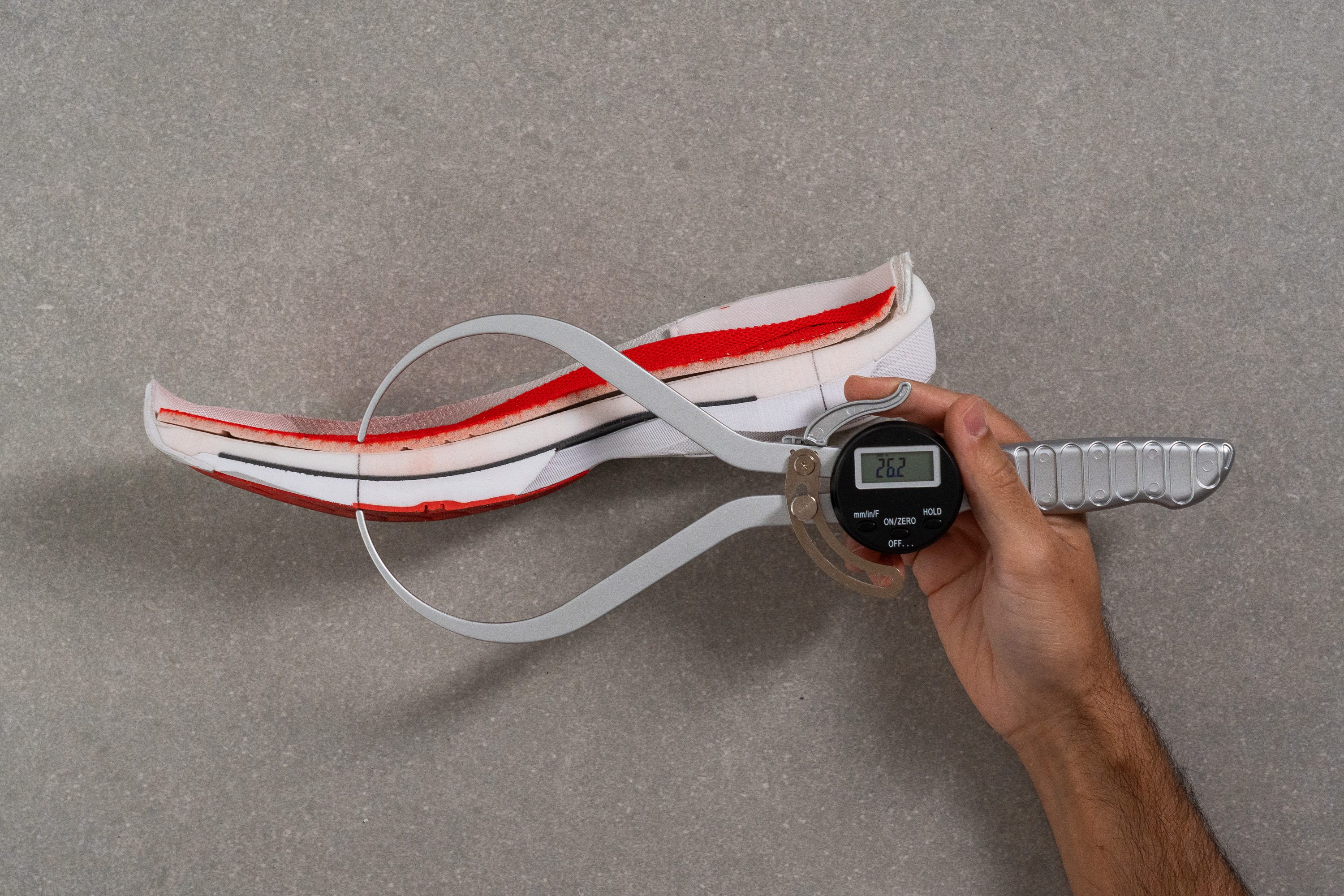
| S/Lab Spectur | 26.2 mm |
| Average | 26.2 mm |
Drop
As a result of stack height discrepancies, our measured heel-to-toe drop also differed from the expected one. Instead of 8 mm, we recorded an above-average offset of 10.7 mm, making this Salomon shoe less friendly for the forefoot/midfoot striking patterns and more accommodating for heel strikers.
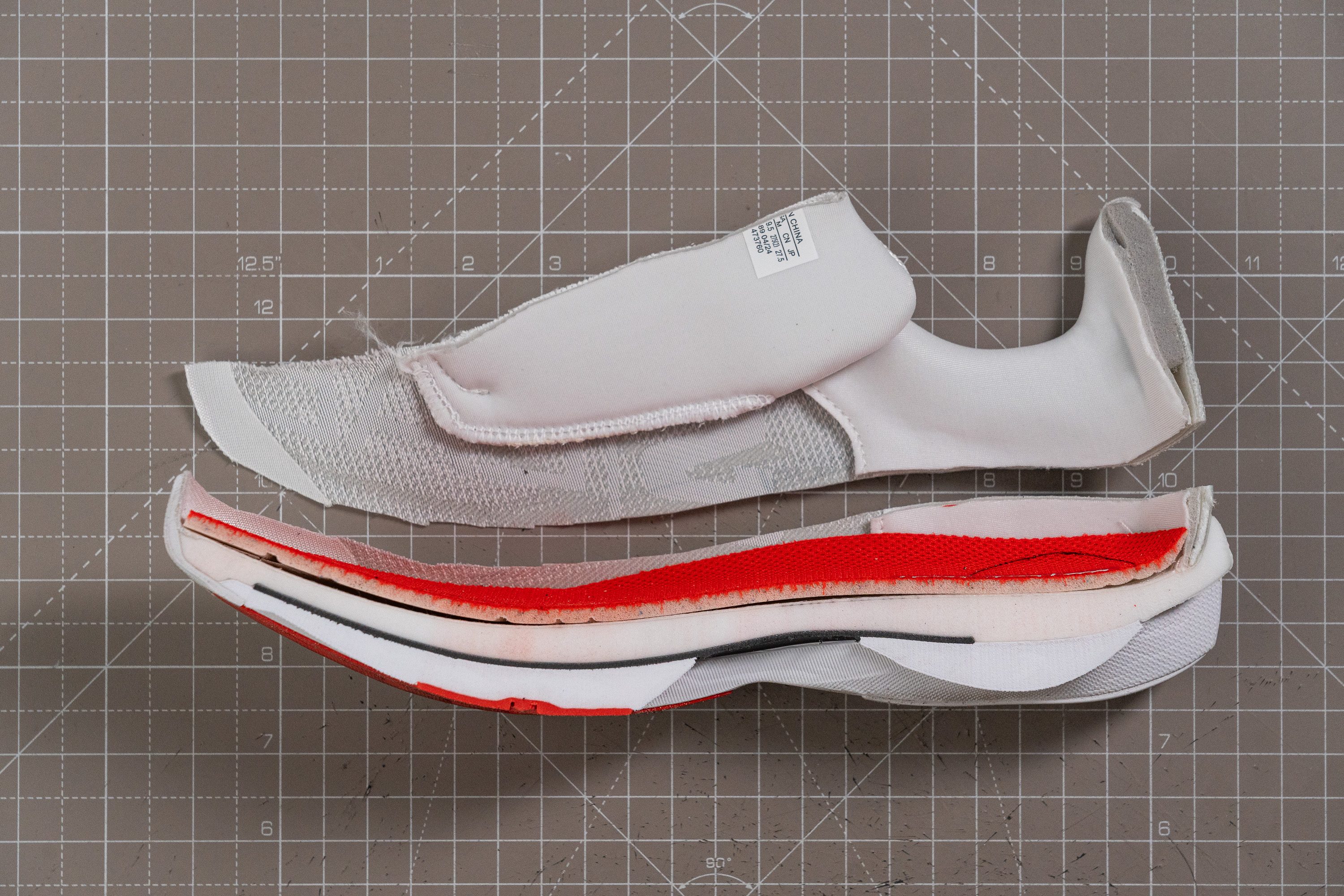
| S/Lab Spectur | 10.7 mm |
| Average | 8.6 mm |
Midsole softness
The S/Lab Spectur feels nice and plush directly underfoot. This is courtesy of the softer PEBA+EVA optiFOAM+ blend in the upper part of the midsole.
Measuring its softness precisely with a durometer, we got a pretty low reading of 13.5 HA, which confirmed our on-foot experience.
| S/Lab Spectur | 23.0 HA |
| Average | 20.4 HA |
Secondary foam
The EVA-based optiFOAM acts as a carrier for the softer compound, forming a cage that stabilizes the ride. With a durometer reading of 23.0 HA, it is notably firmer than the PEBA foam.
| S/Lab Spectur | 13.5 HA |
| Average | 22.7 HA |
Rocker
The 'Reverse Camber,' or, in other words, 'rocker' geometry of the S/Lab Spectur is reflected in its pronounced toe rocker and heel bevel. We found its angles to be comparable to those of most other carbon-plated road shoes in our catalog.
We also noticed that its toe rocker is a bit more aggressive compared to the regular Specter 2. This helps to promote quicker turnovers and maintain a more dynamic pace in the absence of high-rebound foam properties.
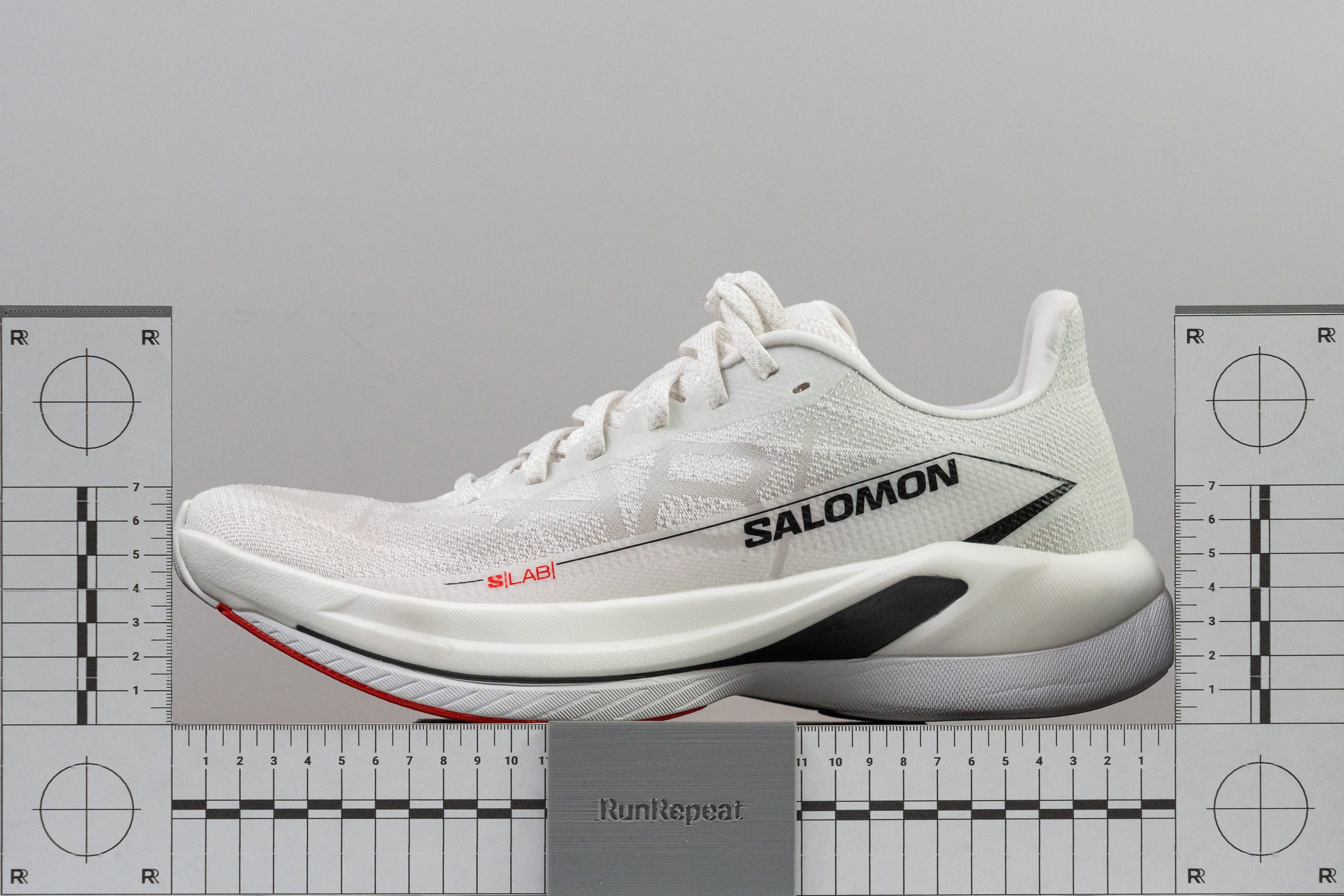
Plate
The S/Lab Spectur's plate is made of carbon fiber and is respectively called the energyBLADE Carbon.
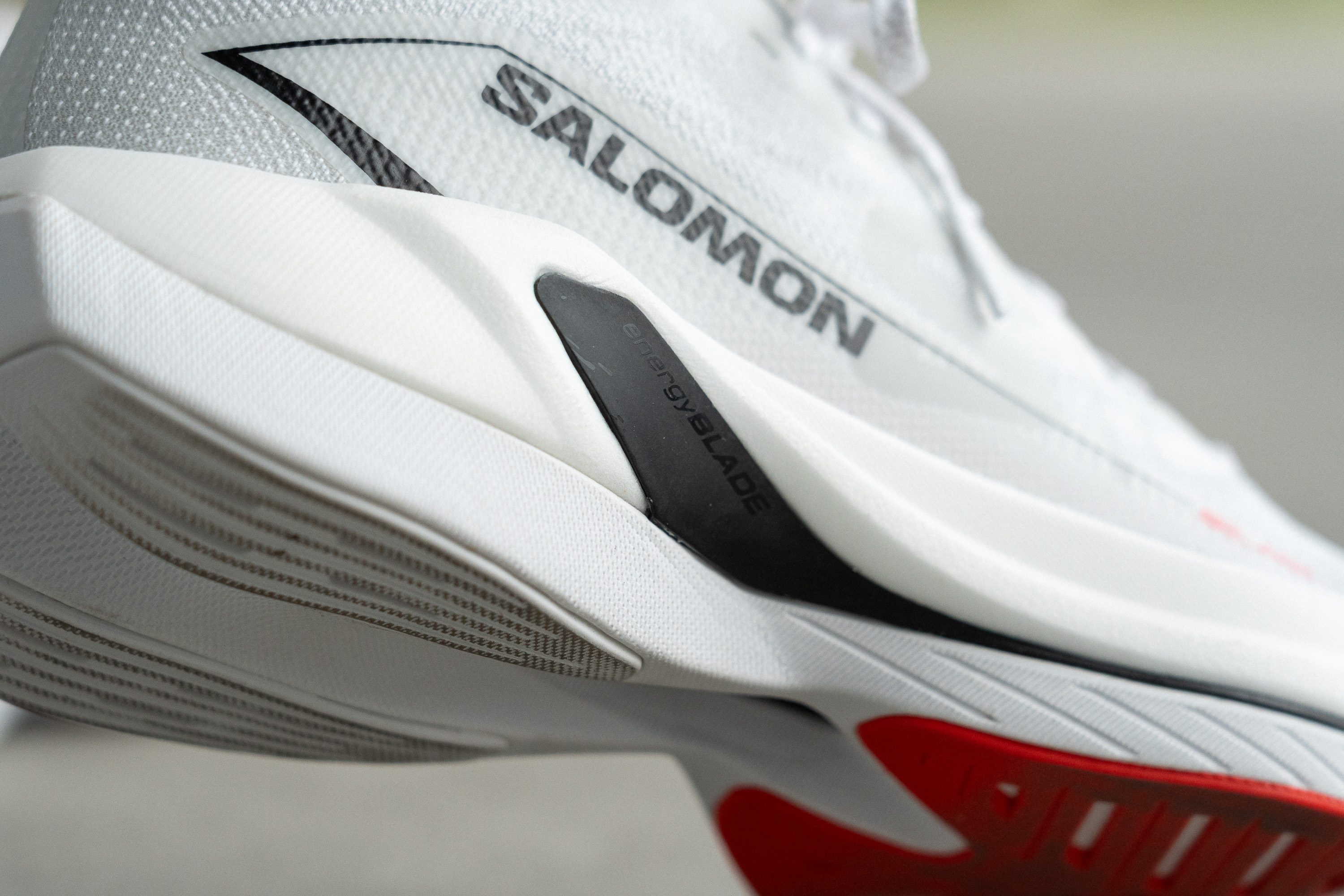
It takes up about two-thirds of the shoe's midsole length and extends up on both sides of the midfoot for a welcome touch of lateral stability.
Size and fit
Size
Width / Fit
Salomon shoes have never been a go-to choice for wide-footed runners, and the brand makes it clear on the S/Lab Spectur's product page that the shoe has a narrow fit.
But how narrow are we talking?
We created a one-to-one gel mold of the shoe's interiors with the help of custom liquid and a freezer.
Once the mold solidified, we measured its widest area with a digital caliper, obtaining a fairly standard reading of 94.7 mm. It turned out to be right on par with the D medium-width shoes in our lab!
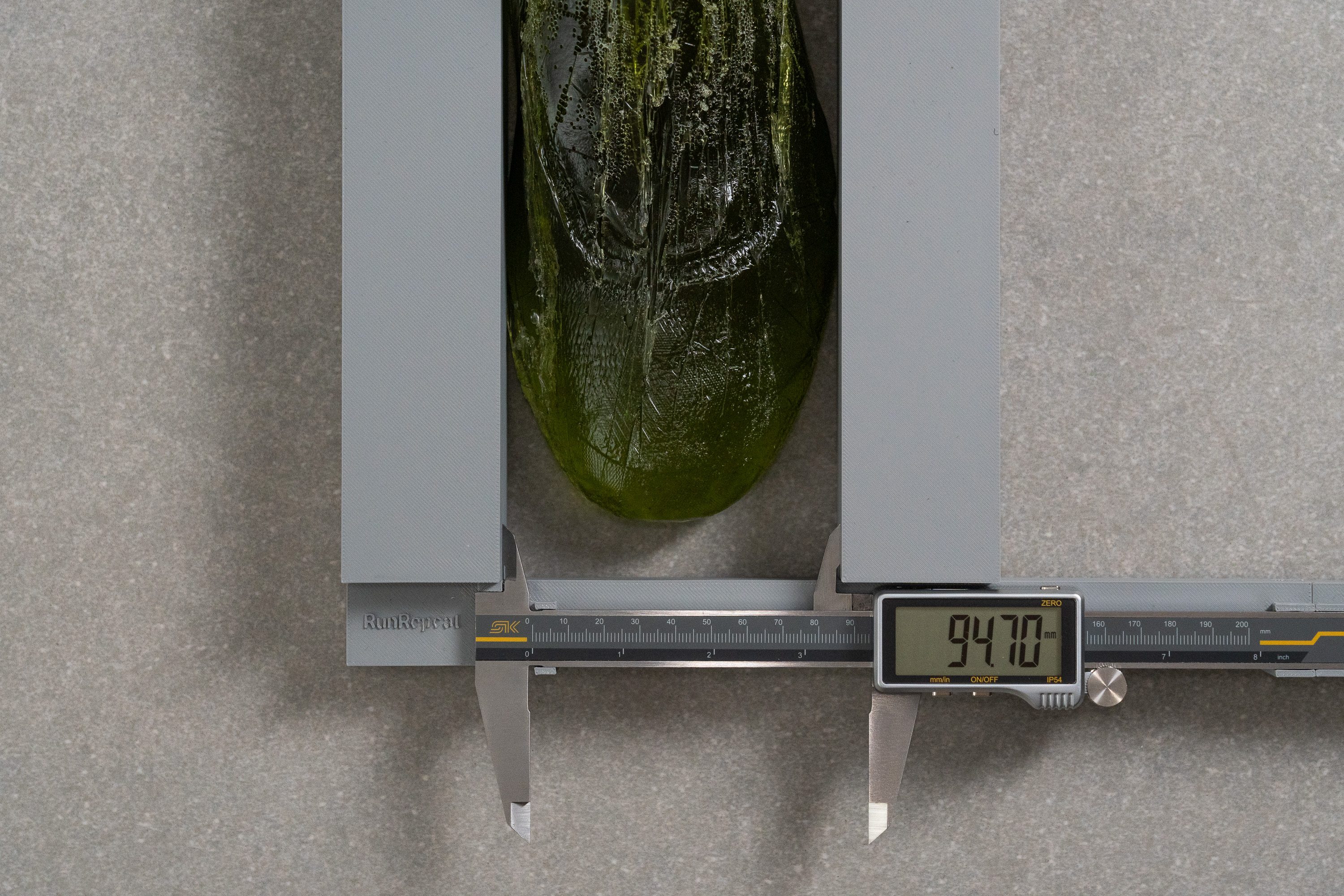
| S/Lab Spectur | 94.7 mm |
| Average | 95.1 mm |
Toebox width
The shoe's toebox shape didn't cause any tightness concerns either. With another standard width of 73.3 mm in the big toe area, it turned out to be just average.
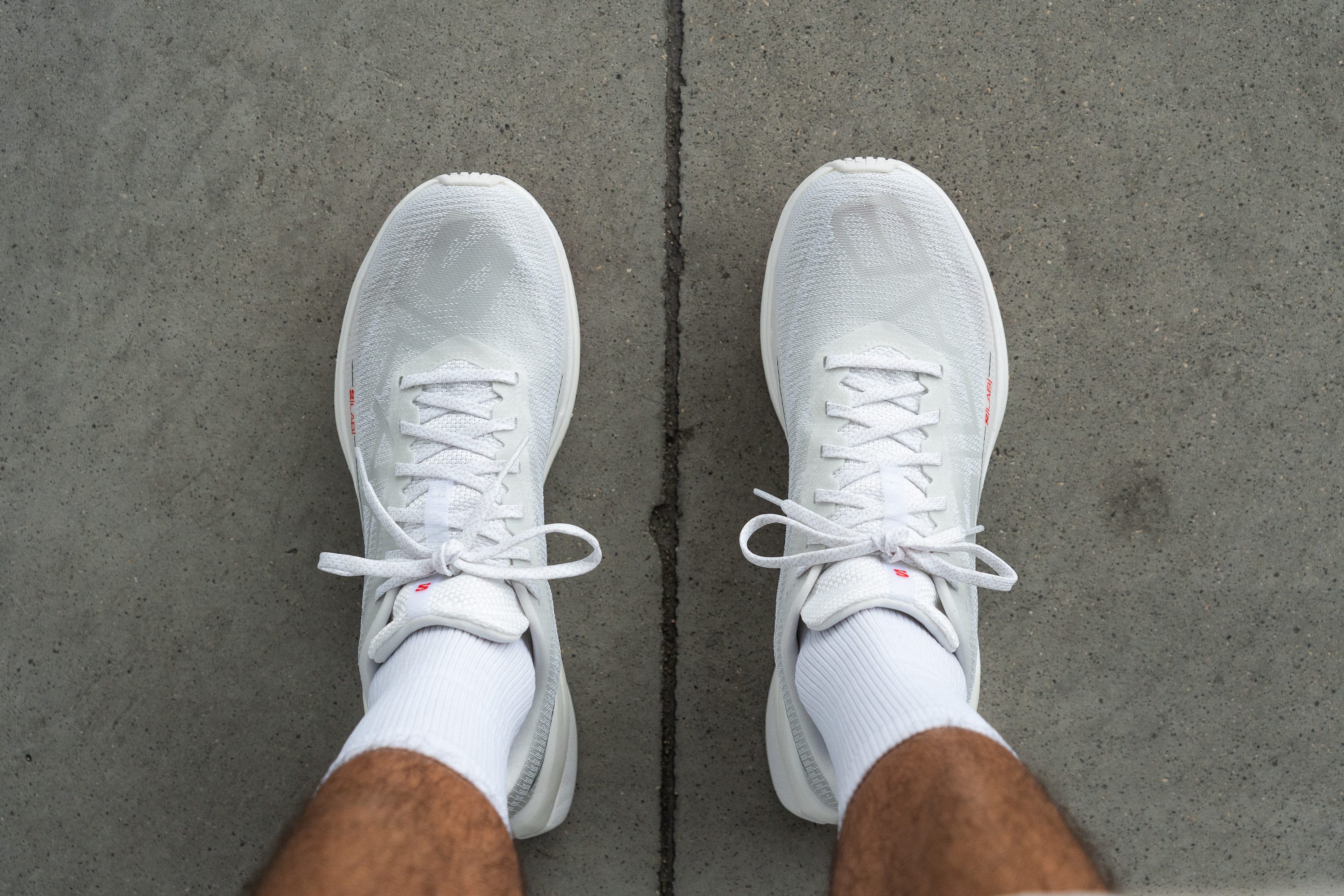
It's not a very roomy fit, but it is just right for a tempo (or potentially even a race day) shoe.
But if you do need a wide fit in a super shoe, check out New Balance's FuelCell SuperComp Elite v5.
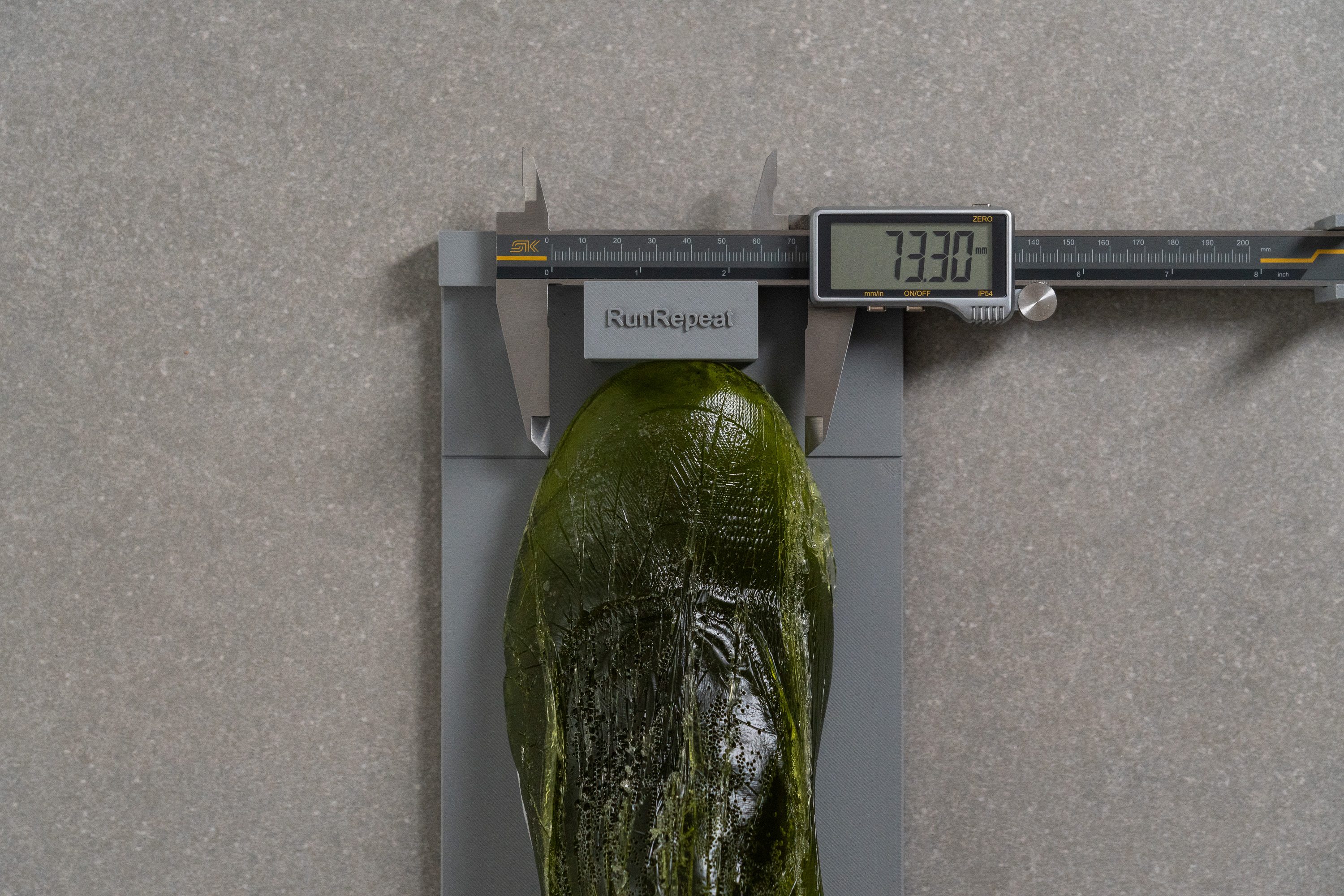
| S/Lab Spectur | 73.3 mm |
| Average | 73.3 mm |
Toebox height
There is no lack of vertical space in the S/Lab Spectur whatsoever.
Its toebox height of 26.0 mm proved to be on par with the average, offering enough wiggle room to prevent toenail pressure.
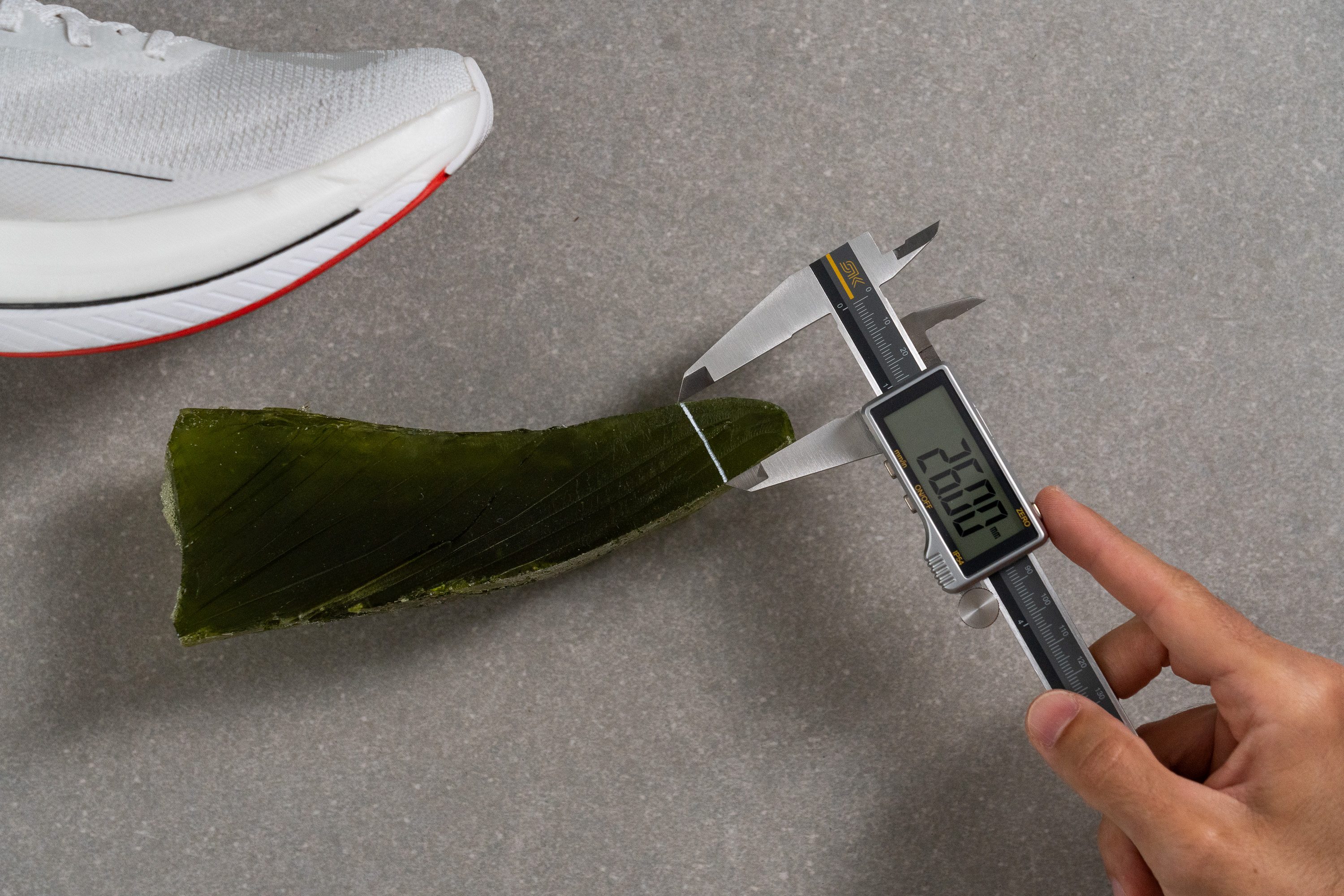
| S/Lab Spectur | 26.0 mm |
| Average | 27.0 mm |
Traction / Grip
Traction test
Offering some of the grippiest trail shoes on the market, Salomon transfers its experience into the Road contaGRIP outsole of the S/Lab Spectur.
The shoe smashed our traction test with an above-average friction coefficient of 0.61, proving that wet pavement, road, or track should never stop you from maintaining a good pace.
| S/Lab Spectur | 0.61 |
| Average | 0.49 |
Outsole design
Even with its narrow midfoot and carved out heel, we found the rubber coverage of this Salomon shoe sufficient for solid ground contact.
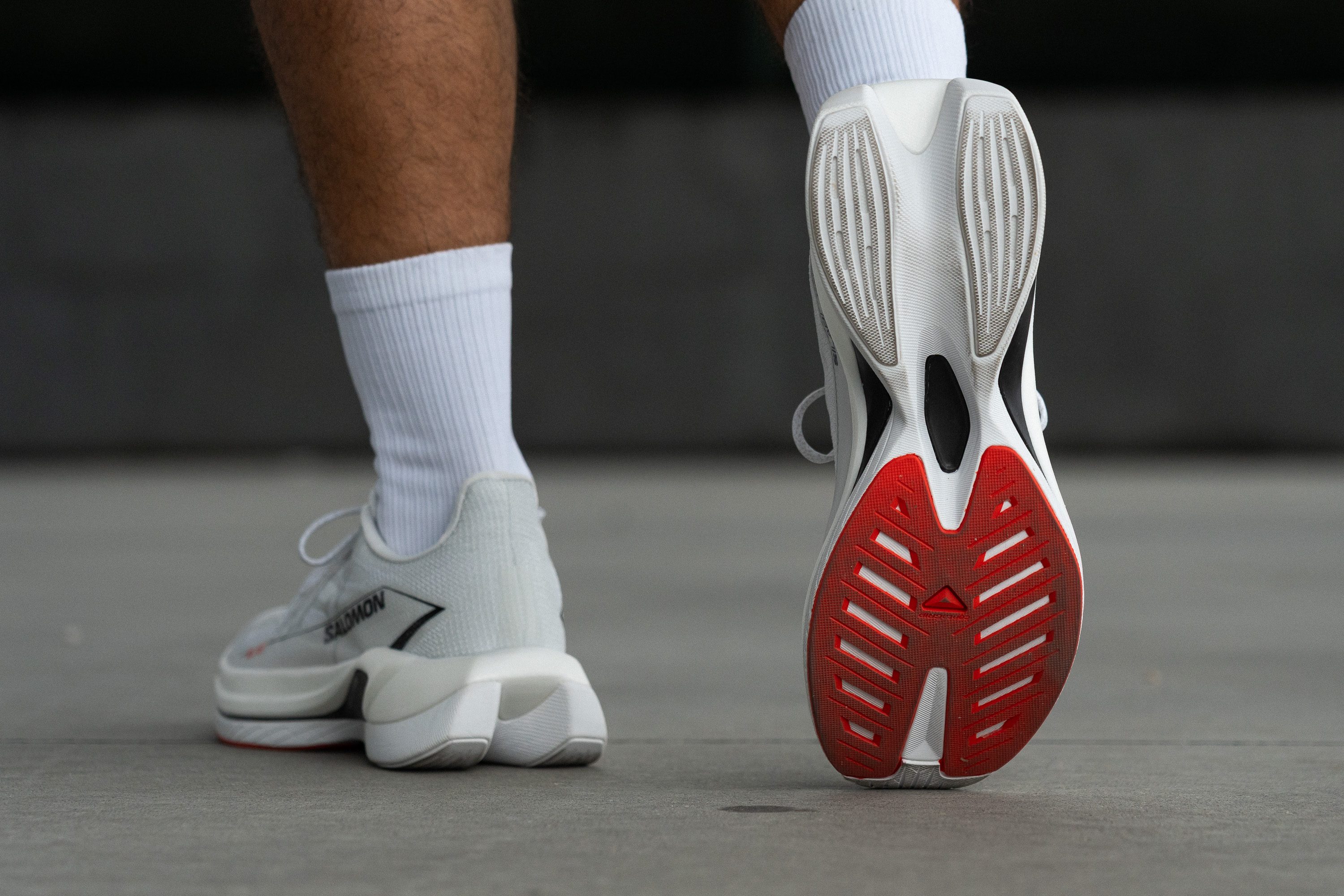
Flexibility / Stiffness
We were surprised to find that the use of a carbon plate didn't make the S/Lab much stiffer than the average road shoe.
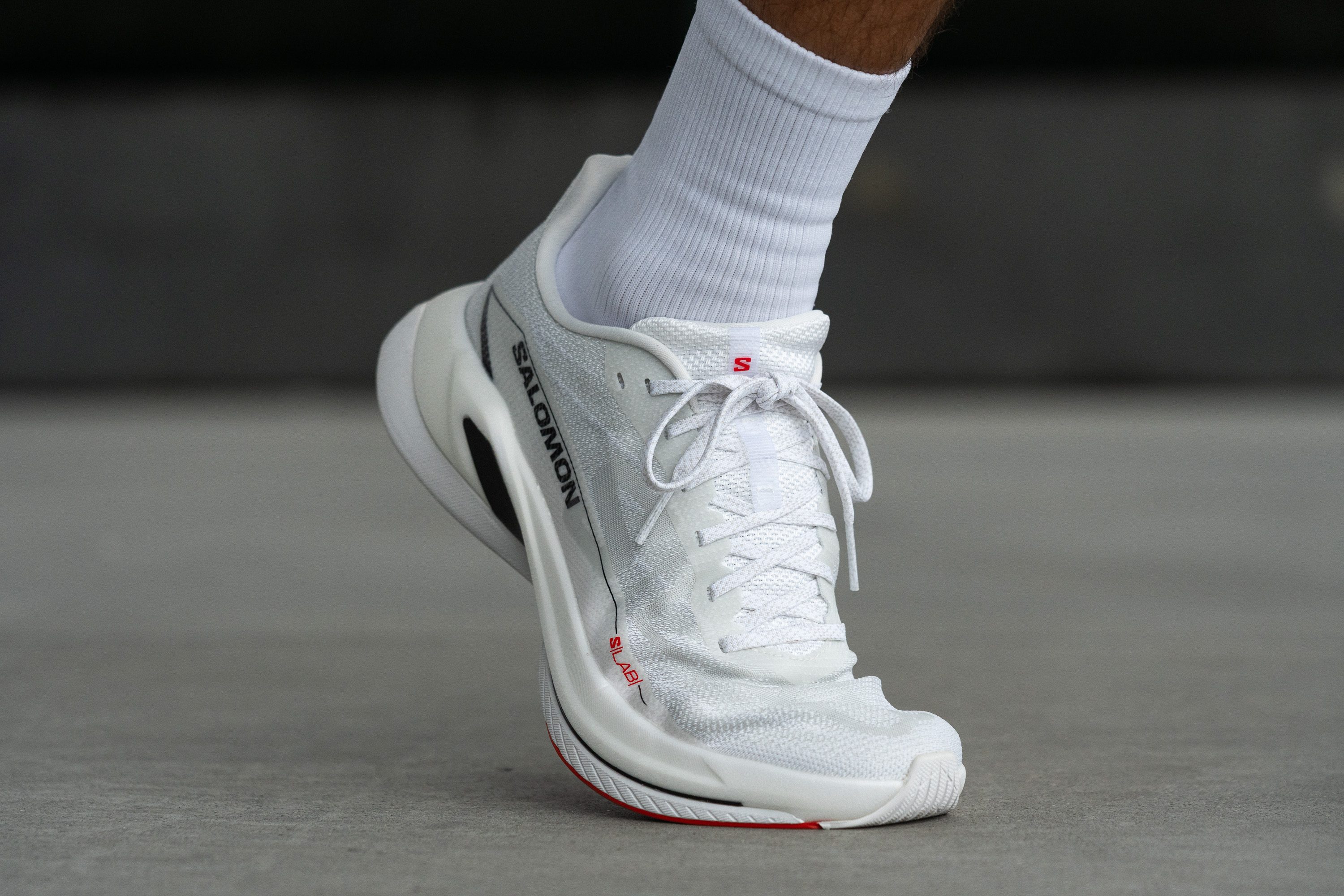
It takes a moderate amount of force (19.5N) to bend the shoe by 30 degrees in our shoe stiffness test. The exact same force as it takes the fiberglass-plated Spectur 2.
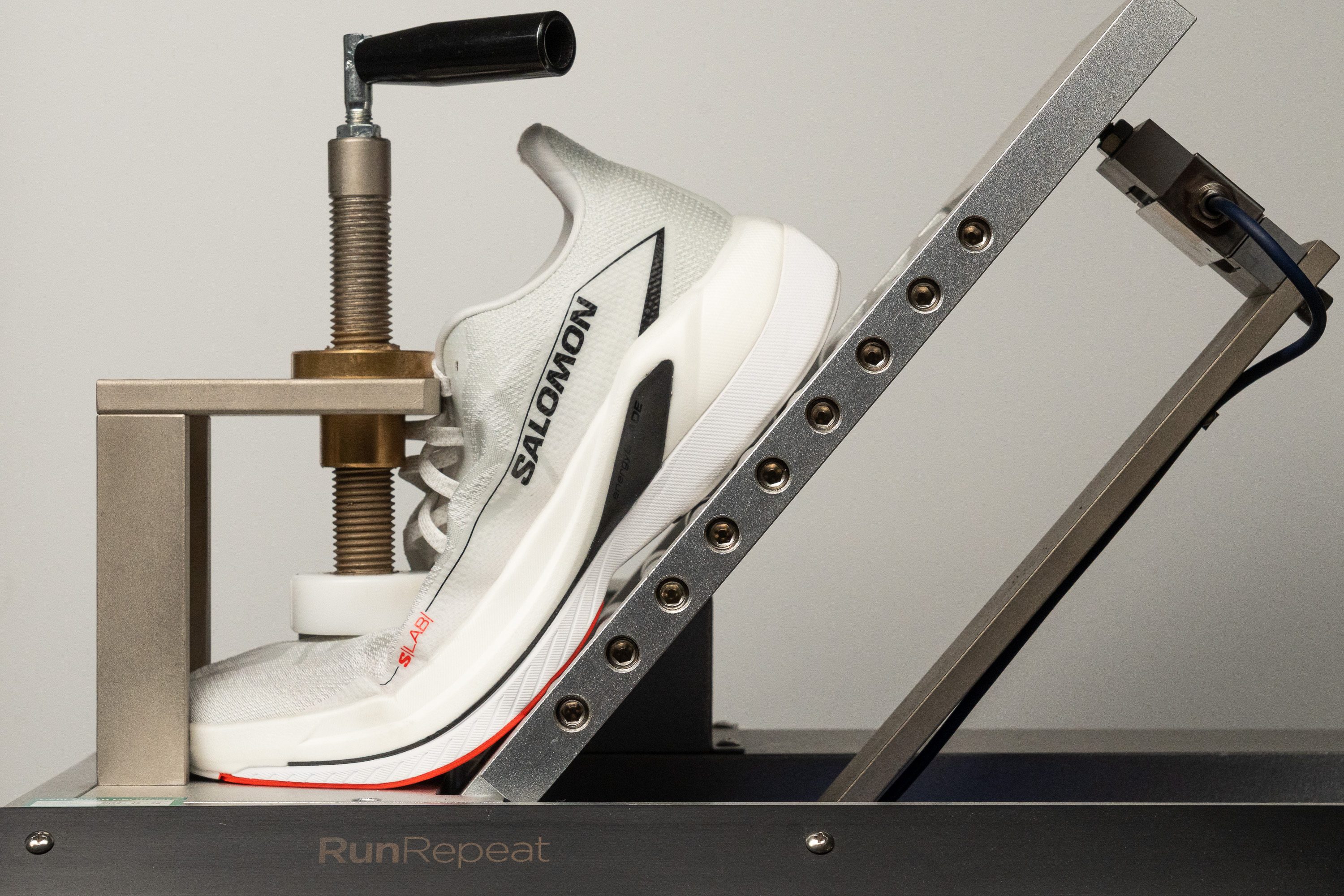
| S/Lab Spectur | 19.5N |
| Average | 15.3N |
Weight
We were hoping that the use of more advanced materials would make the S/Lab Spectur lighter than the standard Spectur 2, but both shoes showed the exact same weight!
Tipping the scale at 9.1 oz (258g) in a men's US size 9, the S/Lab Spectur is a tad lighter than average, but it's kind of hefty for a $220 super shoe with a moderate stack...
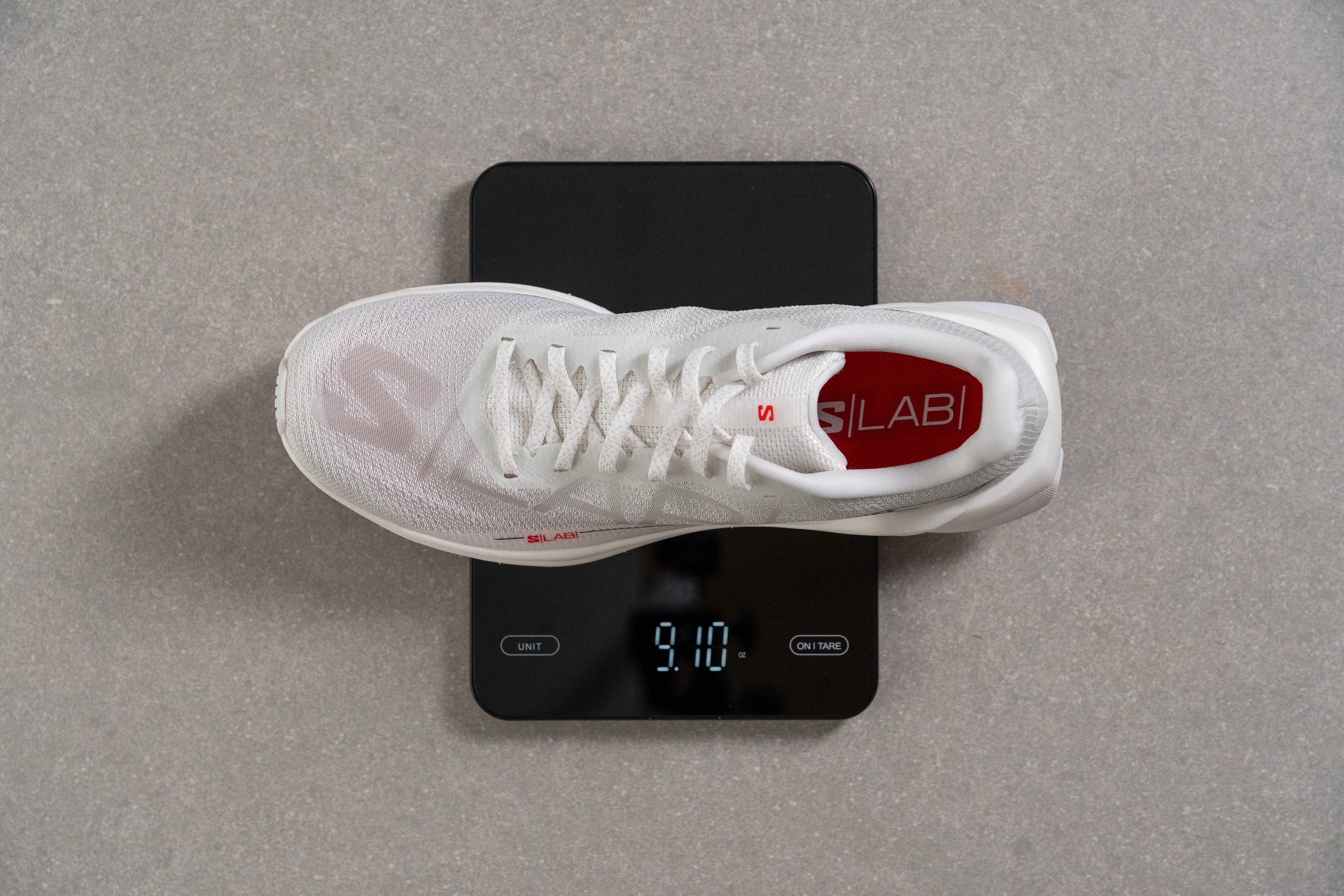
| S/Lab Spectur | 9.1 oz (258g) |
| Average | 9.3 oz (264g) |
Breathability
On a positive note, we found the S/Lab Spectur's upper material superior in quality to that of the standard Spectur.
Although it's still not the most breathable fabric, our smoke-pumping test confirmed that the S/Lab version offered slightly better aeration.
Its toebox, vamp, and quarters proved to be rather thin and transparent in the light test...

...and our microscope revealed that its textile is made of both strong ultra-thin yarns as well as thick and soft ones.

This setup helped increase the shoe's breathability score to 3 out of 5. Not perfect for scorching weather, but great for mild temperatures.
| S/Lab Spectur | 3 |
| Average | 3.7 |
Stability
Lateral stability test
Testing the Salomon S/Lab Spectur both in the lab and out on the roads, we found it to be mildly supportive for a neutral, speed-oriented shoe.
Its squared-off and hoof-like shape works together with the carbon plate wings in the midfoot to add a touch of stability when the runner's striking pattern begins to shift towards the heel on a long run.
Torsional rigidity
Don't be misled by its extremely slim midfoot, because the S/Lab Spectur has a great deal of torsional rigidity! Its sturdy winged carbon plate prevents the shoe from twisting sideways, earning the highest stiffness score of 5/5.
| S/Lab Spectur | 5 |
| Average | 3.5 |
Heel counter stiffness
The heel counter, on the other hand, turned out to be very pliable in the S/Lab Spectur. We gave it a low score of 2 on a 1-5 stiffness scale.
It doesn't offer much rearfoot support, but it feels comfortable around the ankle and Achilles. The back portion of its collar extends high up to minimize the risk of heel slippage.
| S/Lab Spectur | 2 |
| Average | 2.9 |
Midsole width - forefoot
Although the S/Lab Spectur's platform appears to be wide and blocky, our caliper showed that its dimensions don't exceed the average of road shoes.
The widest part of its forefoot, for example, measures 107.9 mm, which is even narrower than average. But it's not too slim to cause instability.
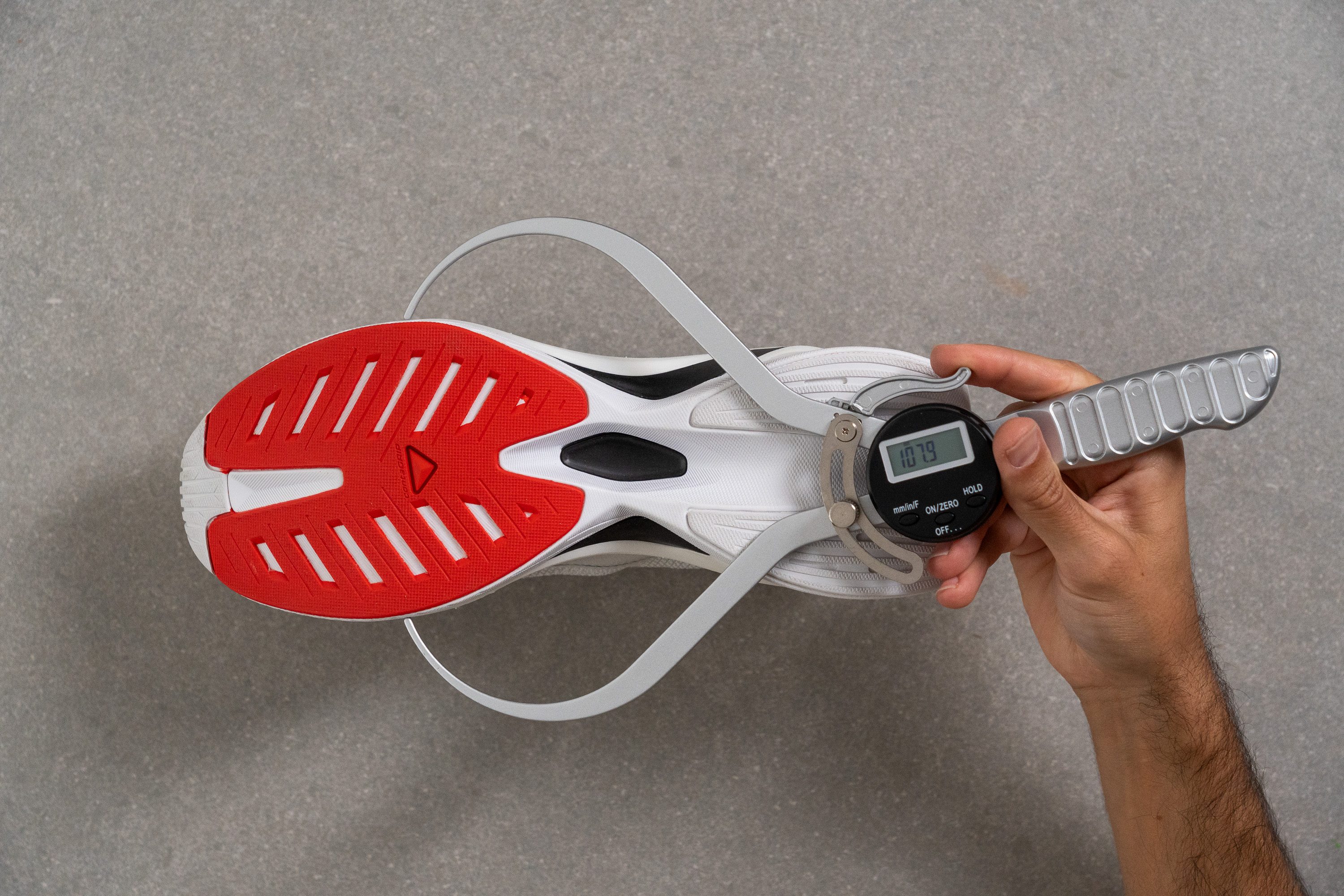
| S/Lab Spectur | 107.9 mm |
| Average | 114.4 mm |
Midsole width - heel
Even the shoe's chunky-looking heel turned out to be simply average at 90.4 mm. Perhaps it appears to be extra broad in contrast to the ultra-narrow midfoot.
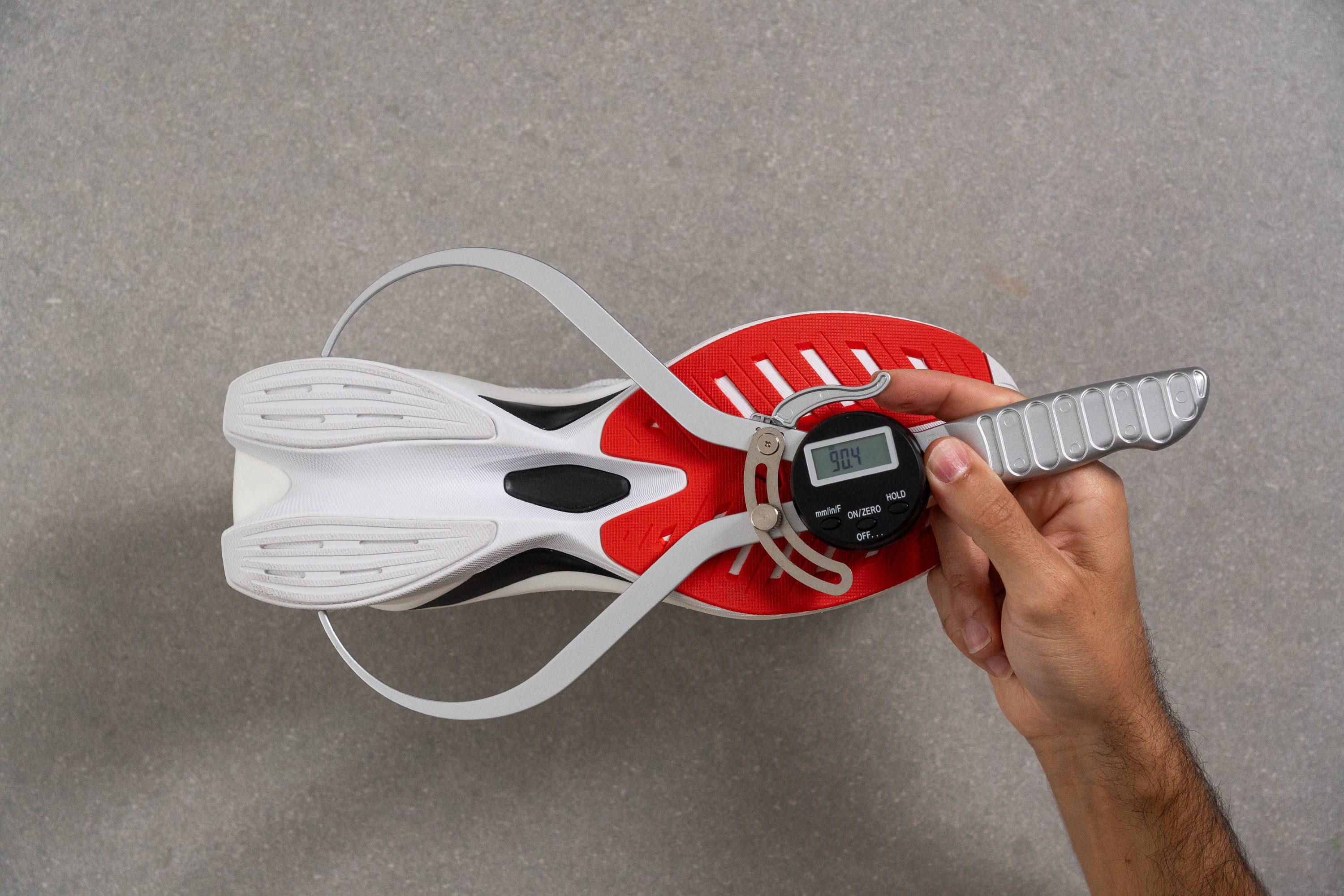
| S/Lab Spectur | 90.4 mm |
| Average | 90.6 mm |
Durability
Toebox durability
Tempo and race shoes can't afford tough upper materials and protective overlays, as each gram counts.
Considering how thin the S/Lab Spectur's upper textile is, we weren't surprised by its poor performance in our Dremel test. However, at least it wasn't too frail, bumping up the toebox durability score to 2/5.
| S/Lab Spectur | 2 |
| Average | 2.6 |
Heel padding durability
The dense fabric on the shoe's heel padding showed slightly better durability results, resisting sandpaper fairly well. That earned it a higher durability score of 3/5.
| S/Lab Spectur | 3 |
| Average | 3.4 |
Outsole durability
But on the bright side, you can always count on Salomon for outsole durability. The Road contaGRIP rubber on the S/Lab Spectur showed solid immunity to abrasion, resulting in a moderate dent of 0.9 mm.
| S/Lab Spectur | 0.9 mm |
| Average | 1.1 mm |
Outsole thickness
The S/Lab Spectur compromised some weight for a thicker outsole, which reflected in a caliper reading of 2.8 mm.
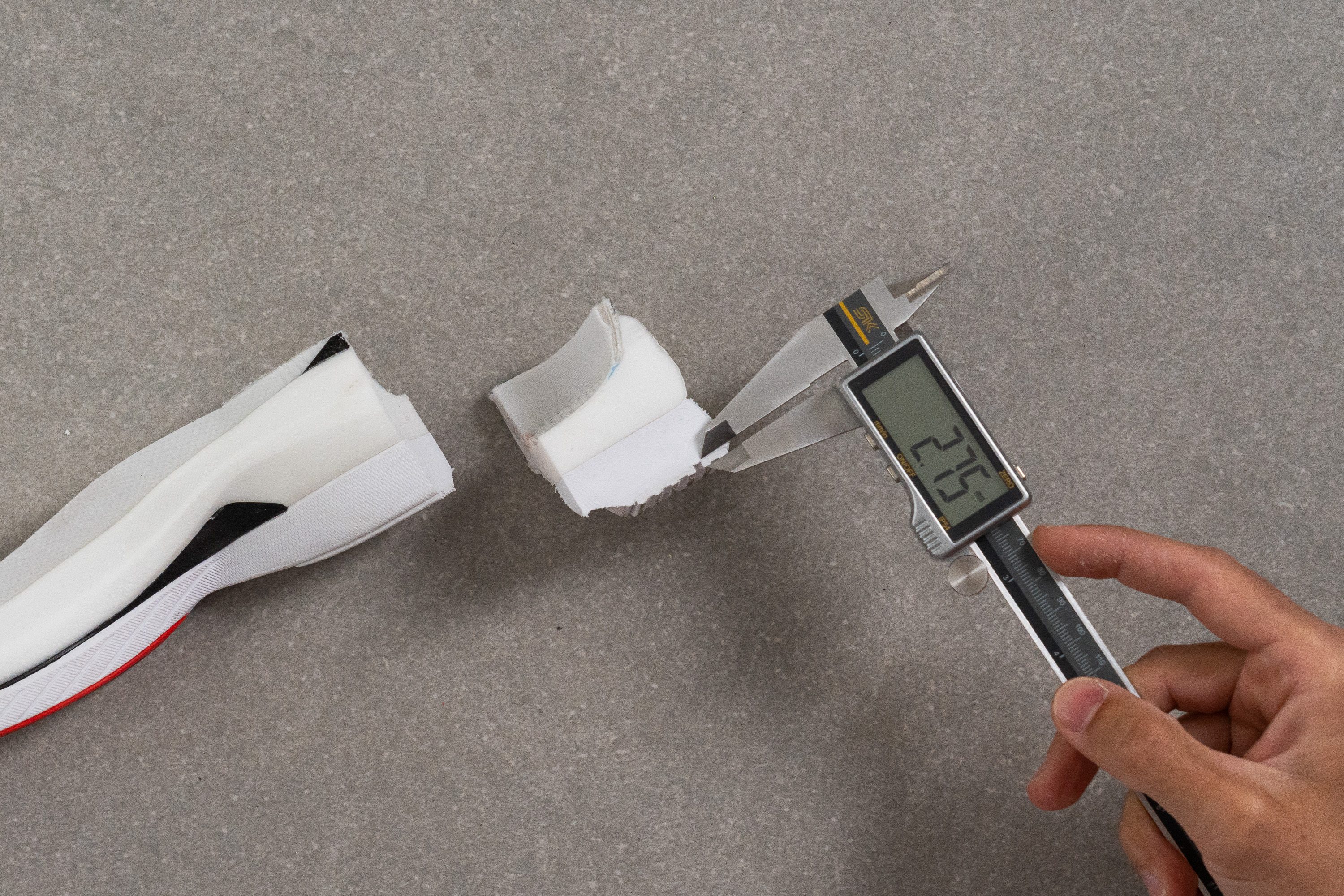
| S/Lab Spectur | 2.8 mm |
| Average | 3.2 mm |
Misc
Insole thickness
Measuring the shoe's insole thickness in the heel, we got a standard caliper reading of 3.9 mm.
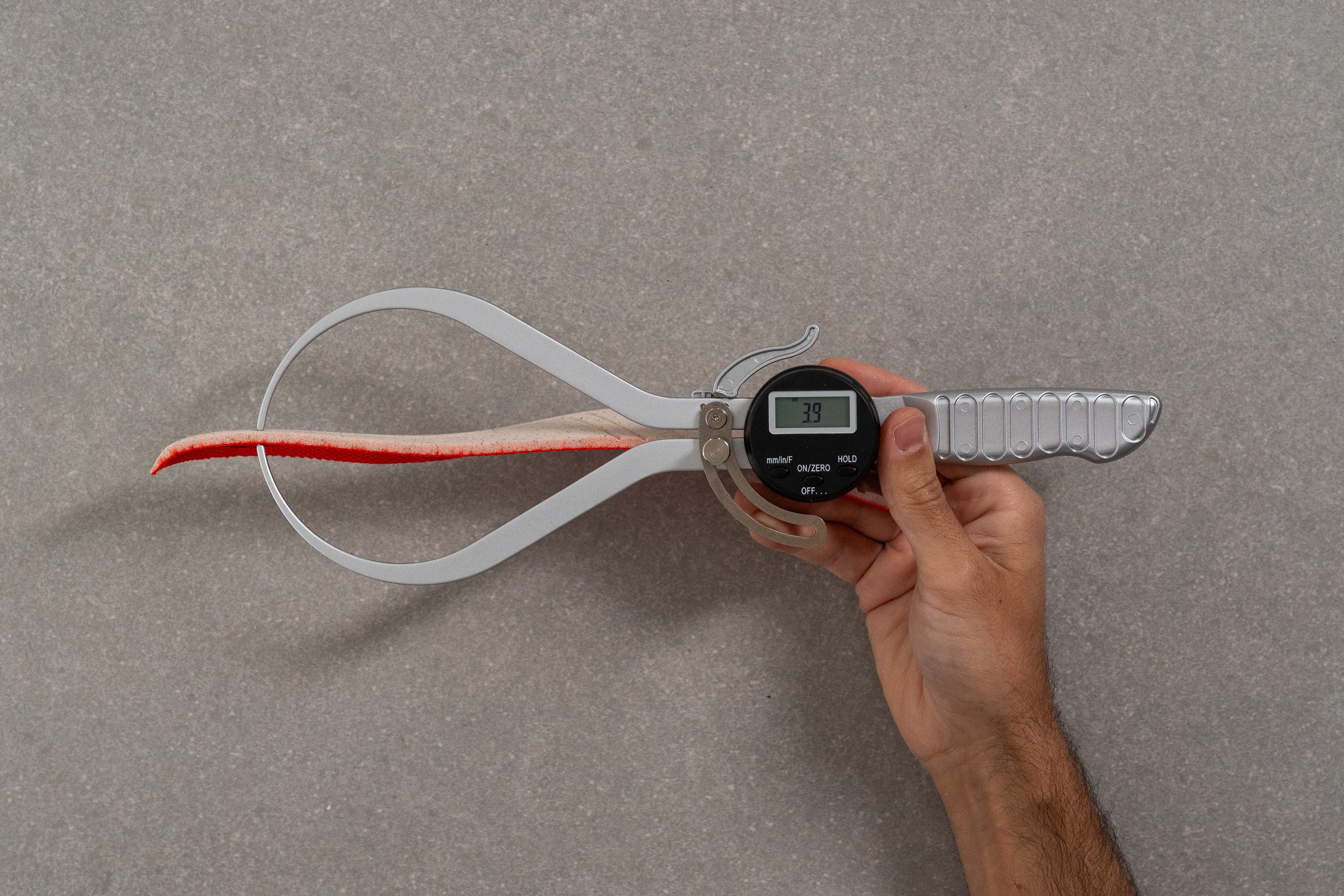
| S/Lab Spectur | 3.9 mm |
| Average | 4.5 mm |
Removable insole
It is a good quality, molded Ortholite insole, but if you need to use a custom orthotic, it is also easily removable.
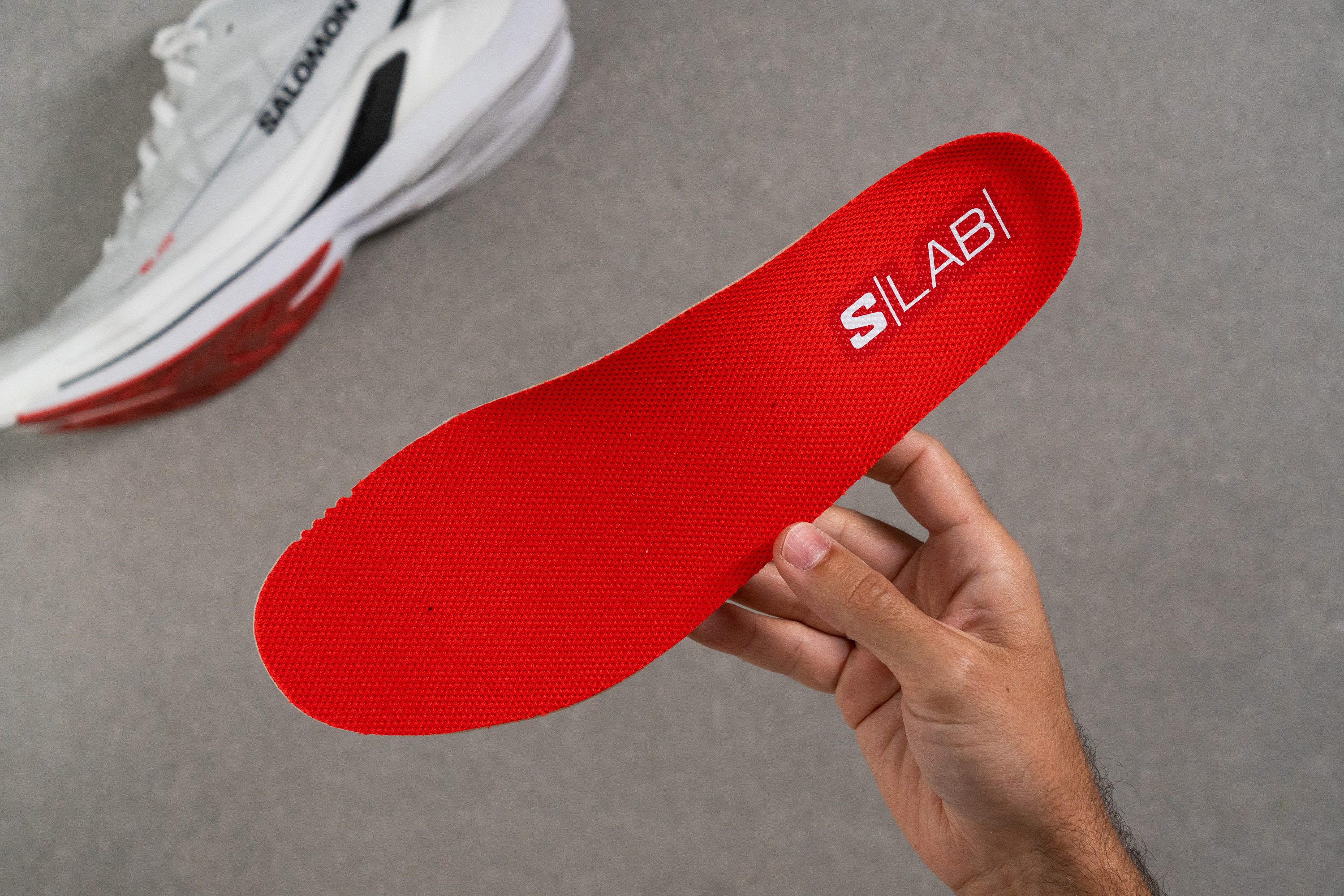
| S/Lab Spectur | Yes |
Midsole softness in cold (%)
To check how the shoe's dominant optiFOAM (EVA) reacts to chilly weather, we kept the shoe in the freezer for 20 minutes and repeated the durometer measurement.
The reading went from 23.0 HA at room temperature to 26.6 HA in cold conditions, which is a fairly moderate increase of 16%.
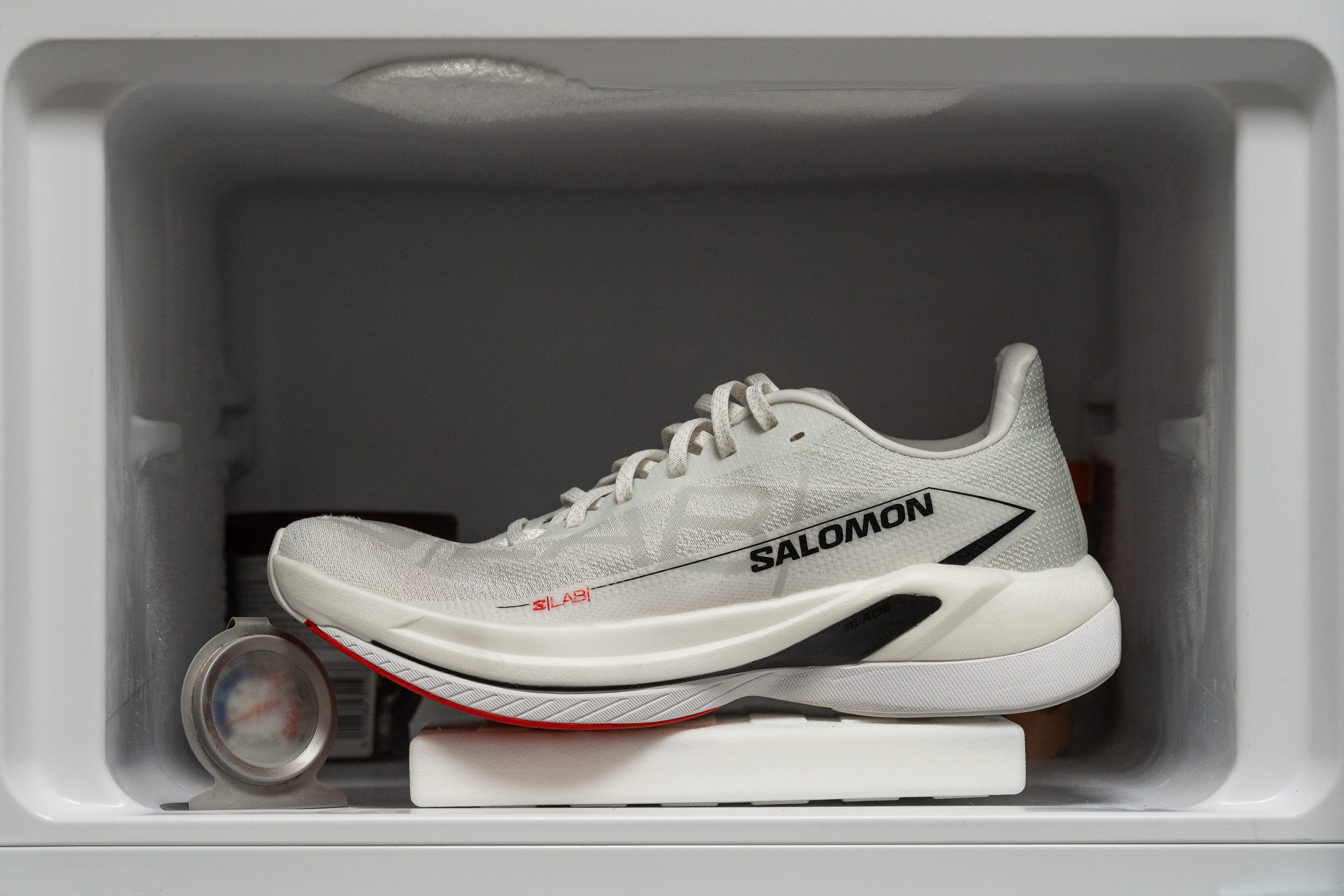
| S/Lab Spectur | 16% |
| Average | 24% |
Reflective elements
Running in the dark or low-light conditions, keep in mind that this Salomon shoe doesn't have any reflective elements.
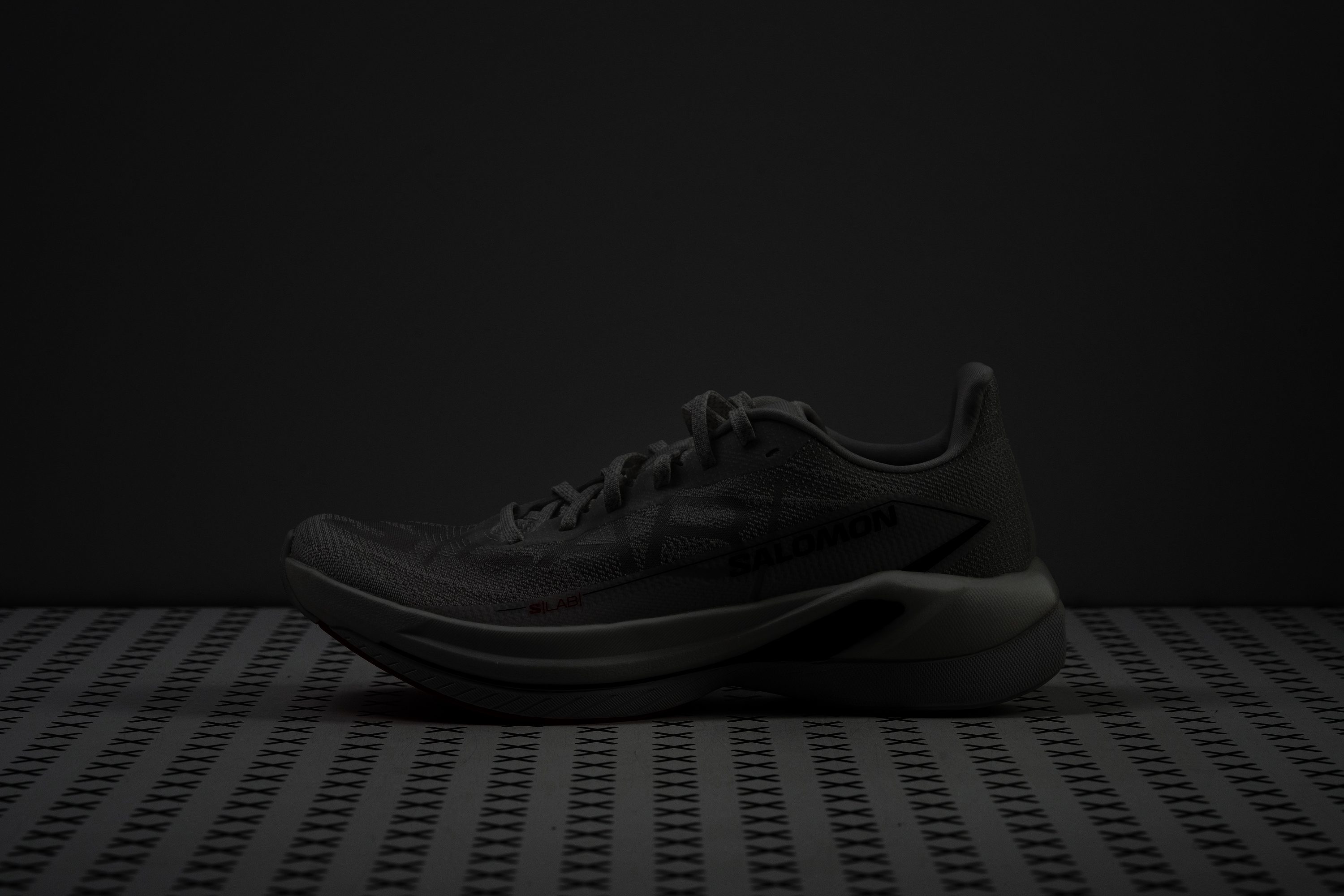
| S/Lab Spectur | No |
Tongue padding
The Spectur's interiors are packed with a moderate amount of foam in the tongue and collar, offering an essential touch of comfort.
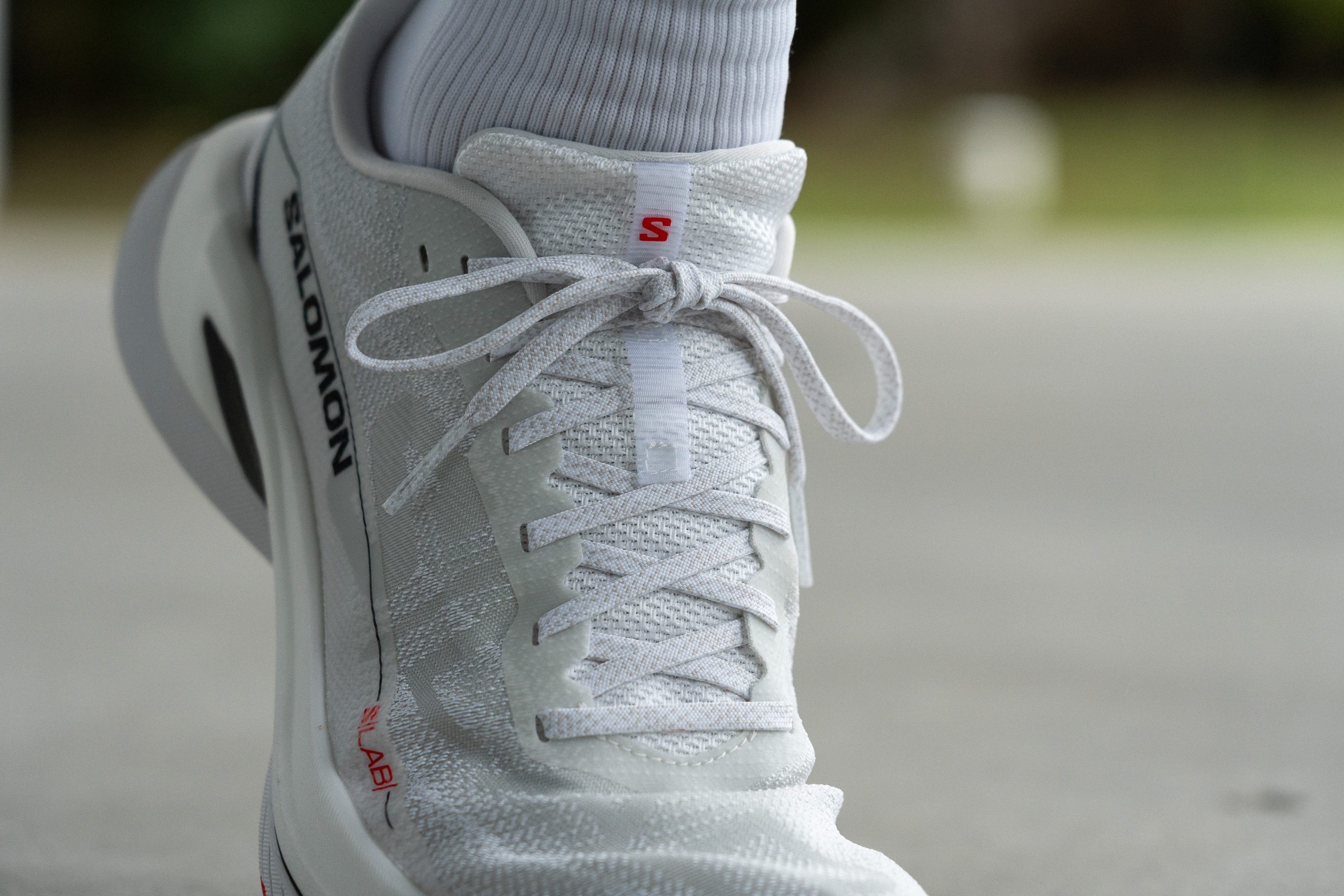
With a tongue thickness of 5.2 mm, it is padded just enough to prevent lace bites.
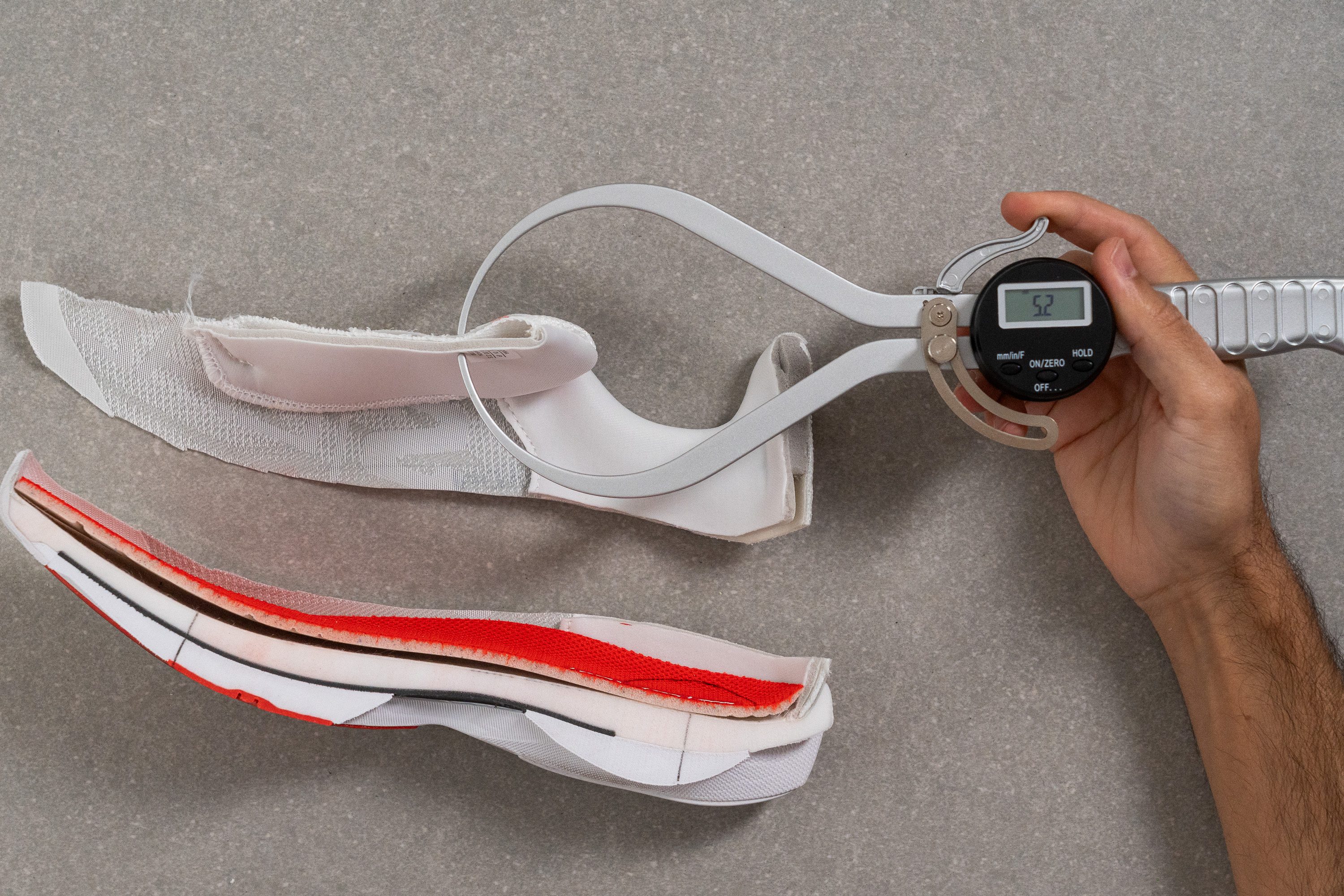
| S/Lab Spectur | 5.2 mm |
| Average | 5.7 mm |
Tongue: gusset type
Although we can't complain about tongue sliding or lack of midfoot lockdown, the presence of tongue gussets would've improved the fit and feel of this shoe.
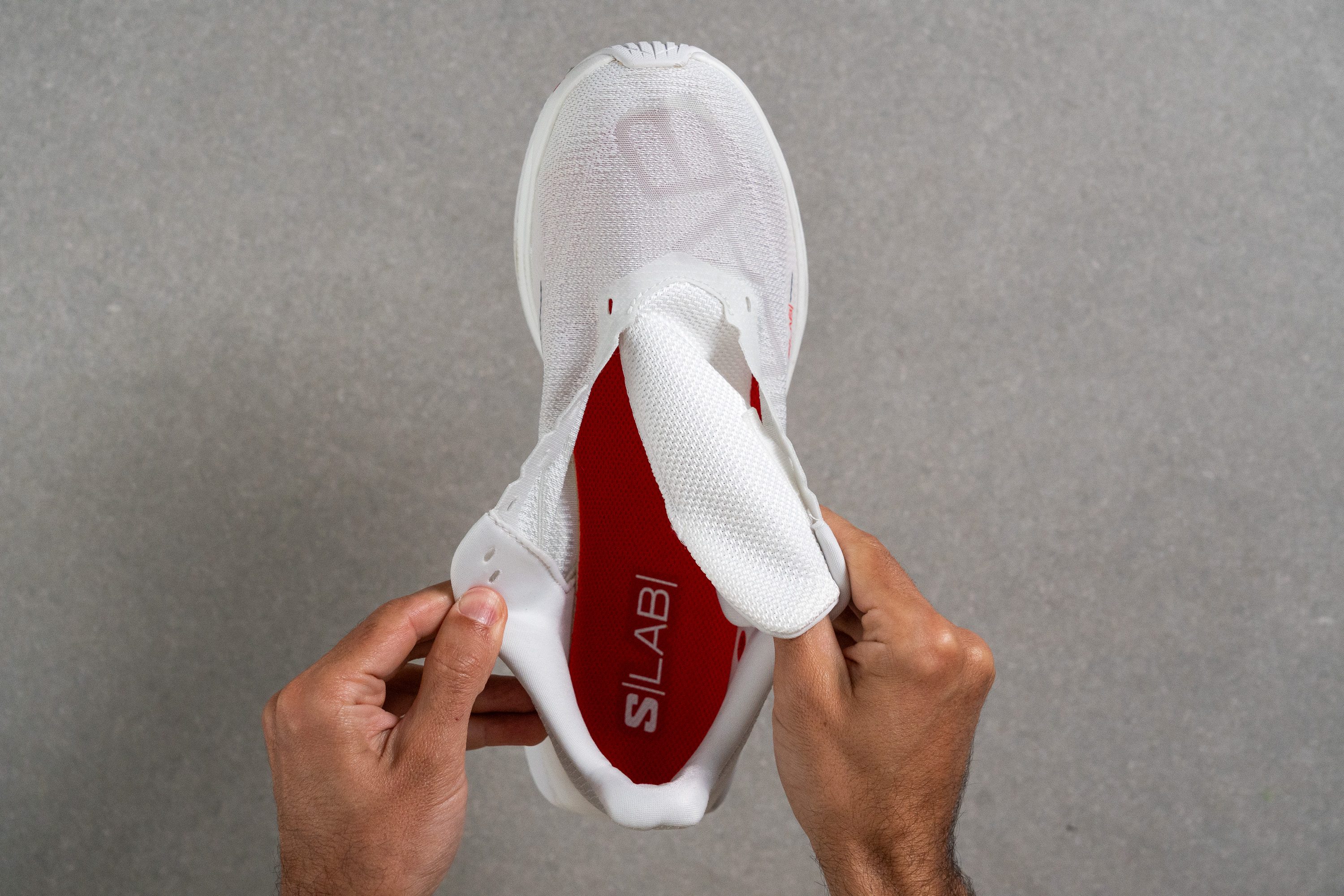
| S/Lab Spectur | None |
Heel tab
The shoe's extended heel collar can aid with the on-and-off in lieu of a pull tab.
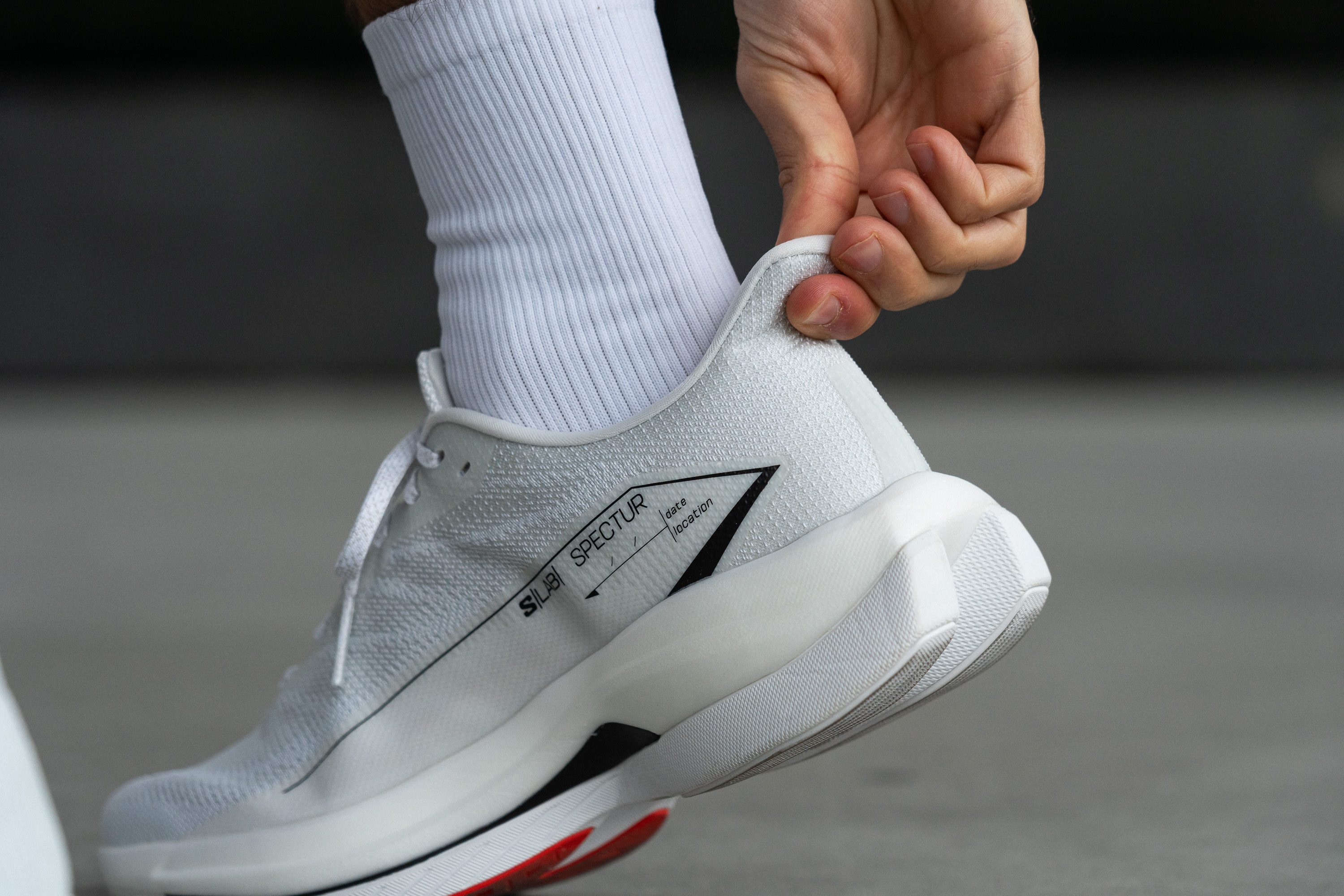
| S/Lab Spectur | Extended heel collar |
Price
Overpriced. That's our verdict.
The S/Lab Spectur's low energy return feels illegal at this price point. Having tested nearly all super shoes on the market, we can suggest a number of performance-boosting alternatives that cost the same or even less!
PUMA Deviate Nitro Elite 3 and Saucony Endorphin Pro 4, to name a few!
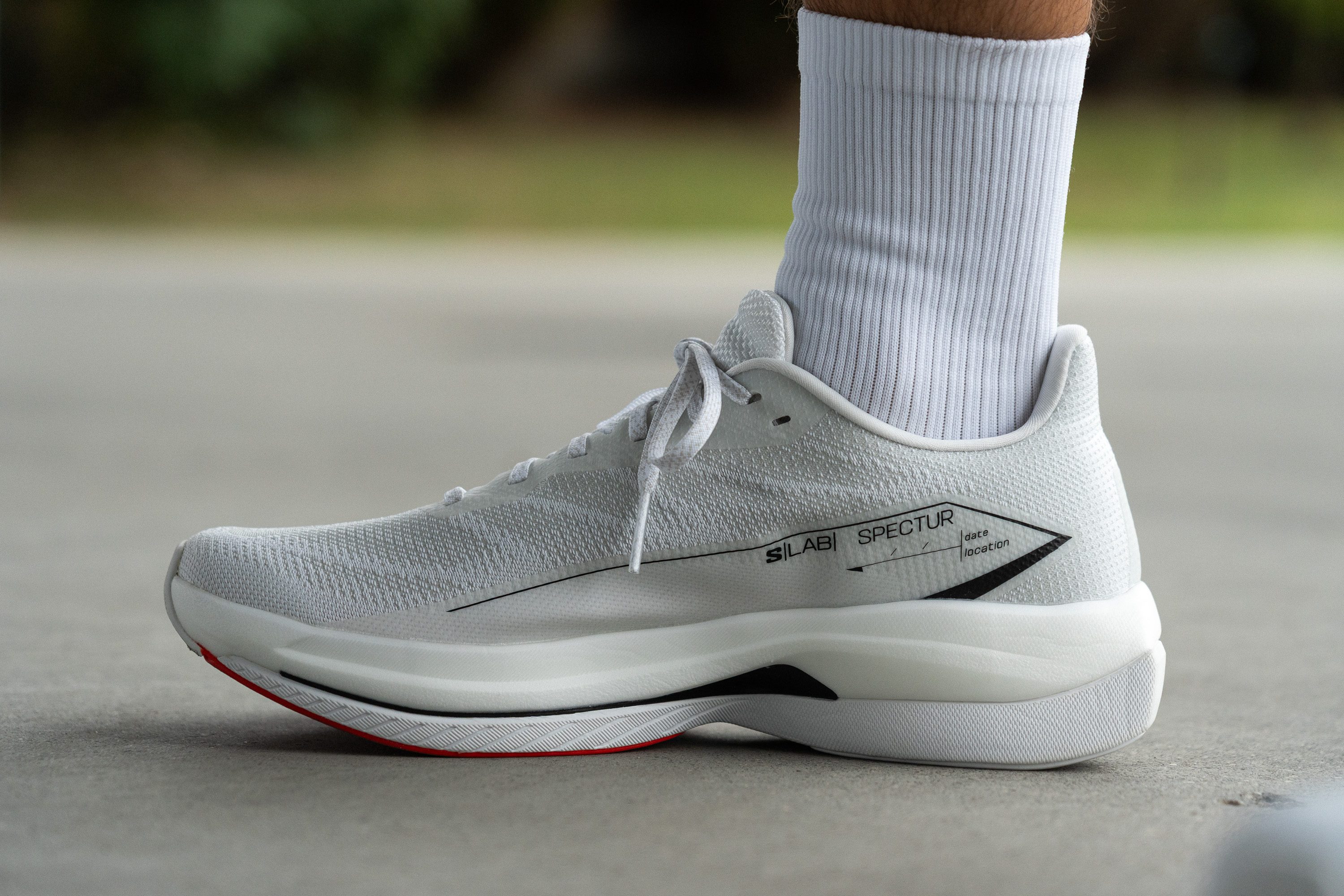
| S/Lab Spectur | $220 |
| Average | $153 |
Mark your next race and PB
Salomon offers a space to note down your personal record (or visualise one) on the medial side of the right shoe...
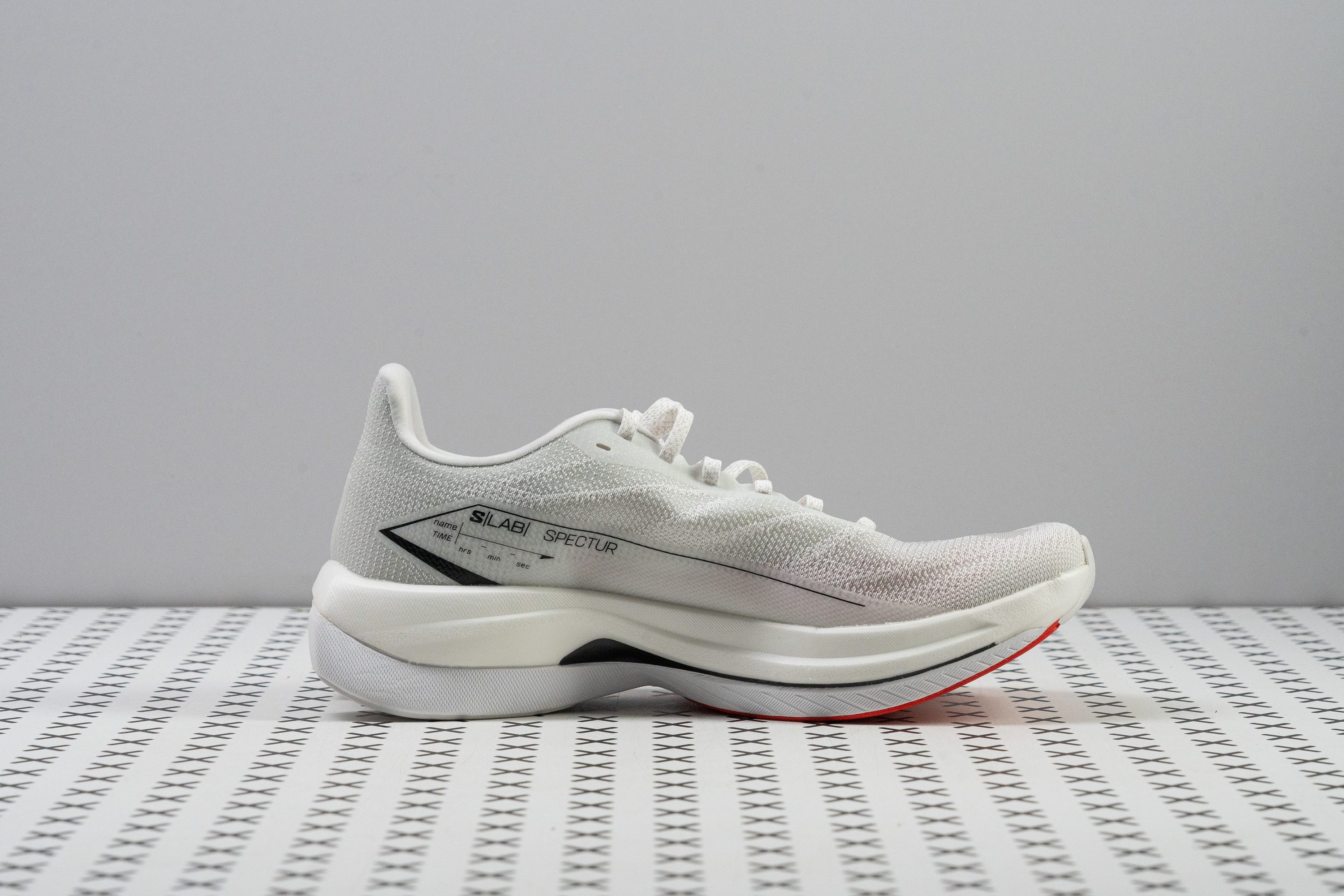
...and a space to mark the date and location of your next race.
